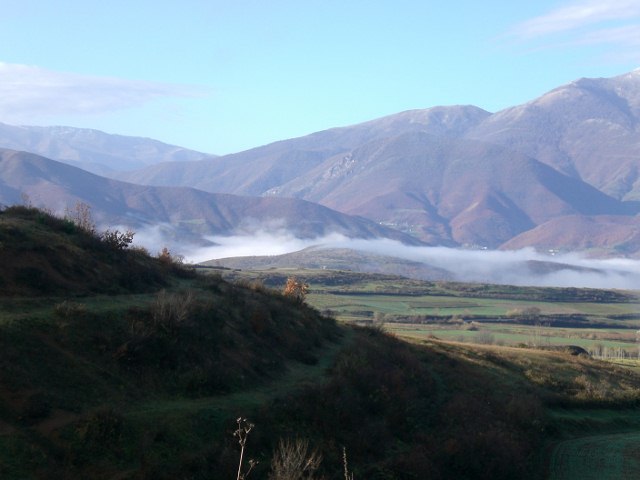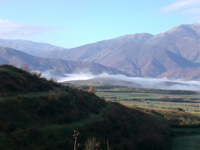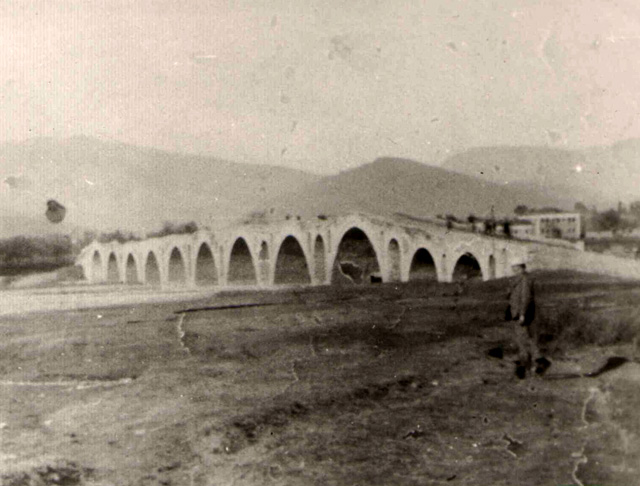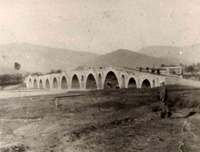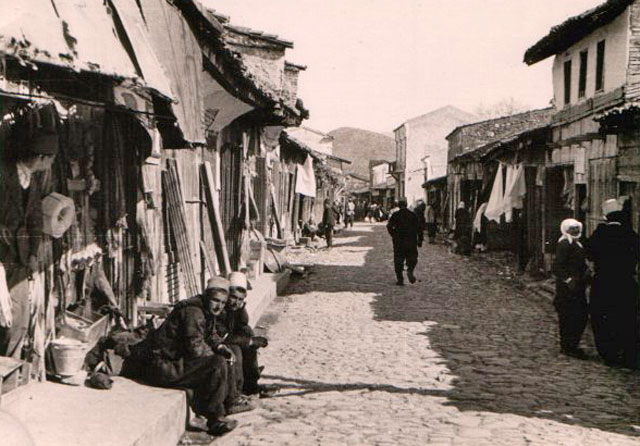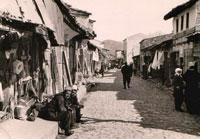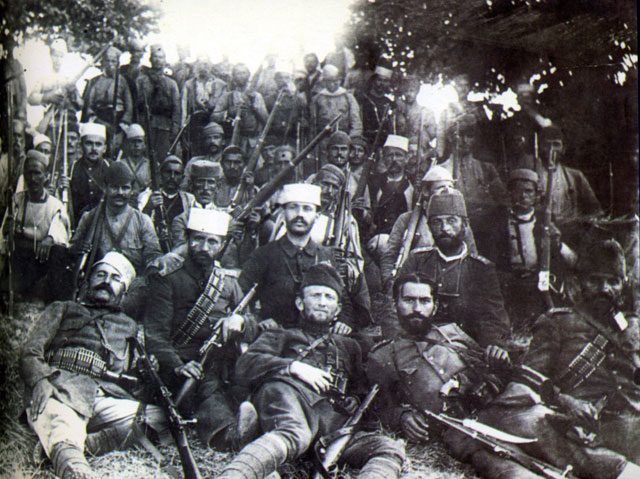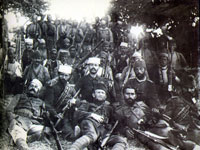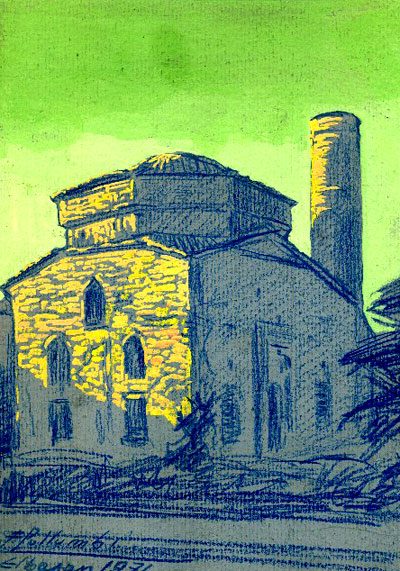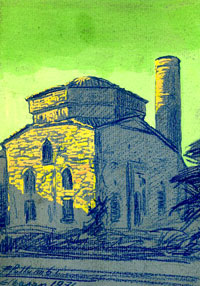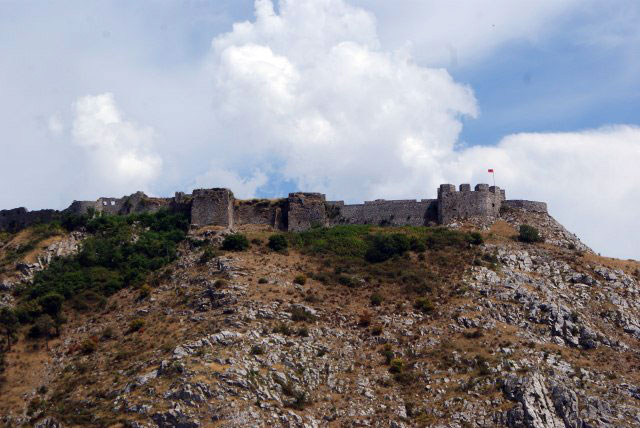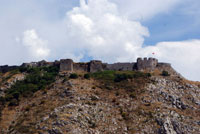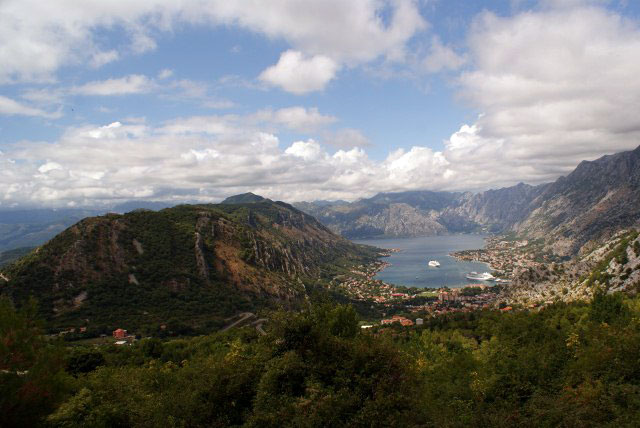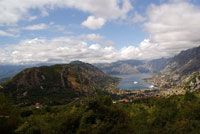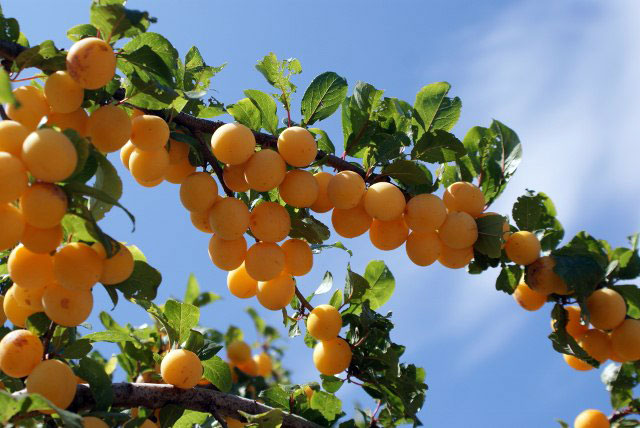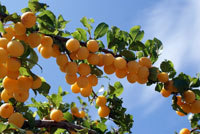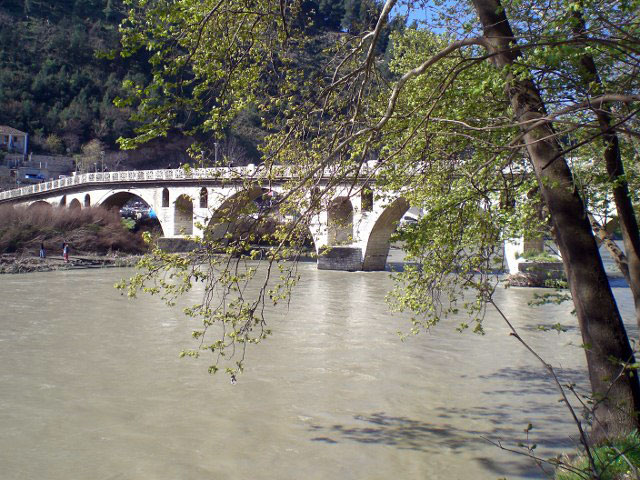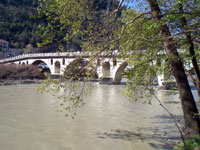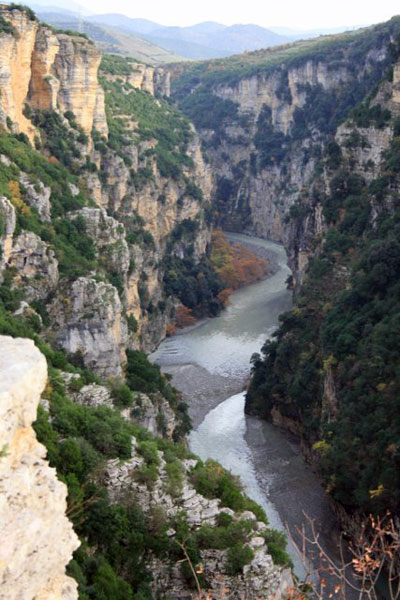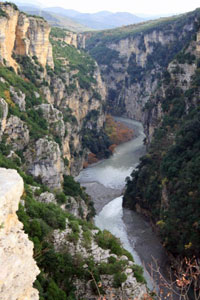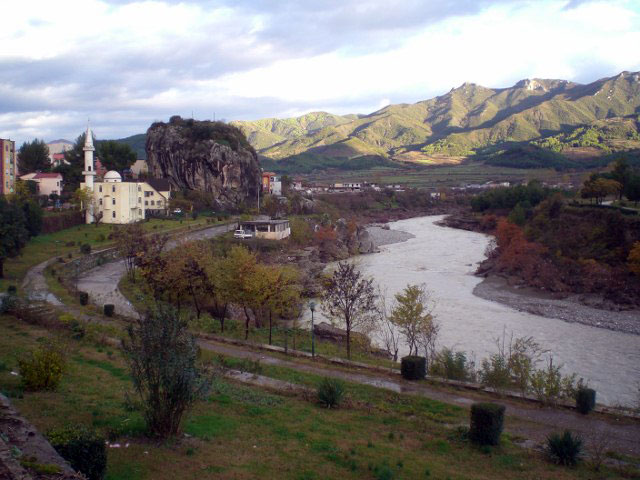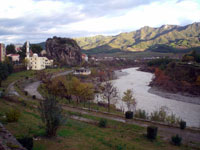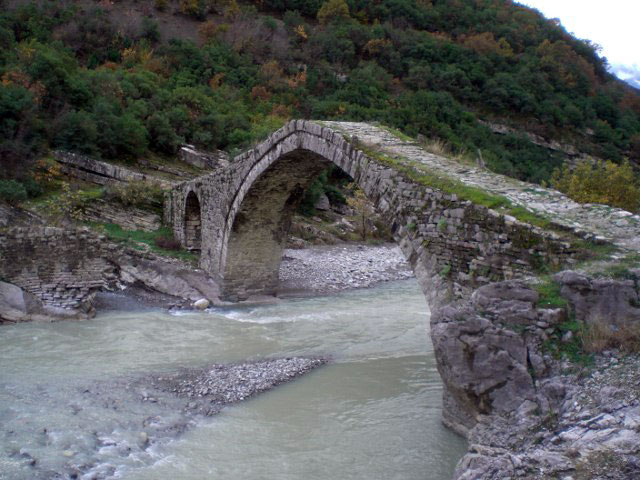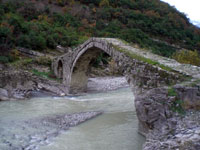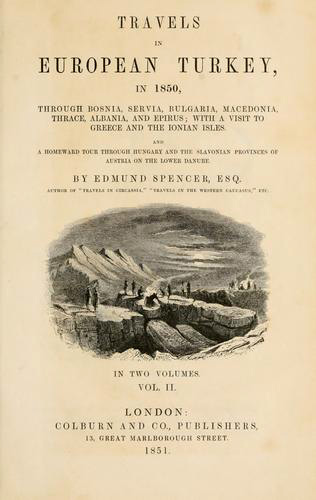| | Robert Elsie | AL Art | AL History | AL Language | AL Literature | AL Photography | Contact | |
Robert Elsie
Texts and Documents of Albanian History
BACK | AL History
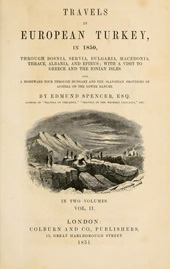
Title page of "Travels in European Turkey", 1850.
1850
Edmund Spencer:
A Journey from Ohrid to Janina
Captain Edmund Spencer was a prolific British travel writer of the mid-nineteenth century. He seems to have lived in Prussia for a time. His first travel book was entitled “Sketches of Germany and the Germans, with a glance at Poland, Hungary, & Switzerland in 1834, 1835, and 1836, by an English resident of Germany” (London 1836). He was in contact with German travel writer, Count Hermann Pückler-Muskau (1785-1871), whose book “Tutti Frutti” he translated into English (London 1836). Spencer’s second great tour took him down the Danube from Vienna to Constantinople and the Black Sea where he visited the Caucasus. He hereafter published his “Travels in the Western Caucasus” (London 1838) and other volumes on the region. Finally, in 1850, Spencer undertook an extensive voyage through the southern Balkans, which he described in his two-volume “Travels in European Turkey, in 1850, through Bosnia, Servia, Bulgaria, Macedonia, Thrace, Albania, and Epirus, with a visit to Greece and the Ionian Isles” (London 1851). The Albanian portion of this epic journey took him on horseback and on foot from Ohrid to Mirdita, Elbasan, Kruja, Shkodra and up to Kotor, and then back to Elbasan from where he continued on to Berat, Përmet, and Janina. This description of mid-nineteenth century Albania, with much rare insight, is given as follows.
A Journey from Ohrid to Janina
CHAPTER IVImperial fisheries of the Sultan – Defile of the Drin – Ascent of the Miriditi Mountains – Hospitality of the inhabitants – Aspect of the country – Arrival at the Djeta of a Miriditi chieftain – Sketch of Hamsa, the chief – His singular history – Austrian and Italian missionaries – Fanaticism of the Miriditi – Stefa, my kiraidji – Some account of him – The versatility of his religious opinions – The pass of Keupris – Dangerous travelling – Rencontre with a part of Albanian rebels – Ancient bridge over the Scoumbi – Arrival at Elbassan – Description of the town and its inhabitants – The Albanian tribes – Their political tendencies – Some account of the independent tribes of the Miriditi – Depopulation of Albania.
For want of space, we are compelled to conclude our sketches of Ocrida [Ohrid] and its beautiful lake, which if Monsieur Voltaire had seen, he never would have said, when writing upon Geneva, “Mon lac est le premier lac du monde!” And now, having secured another kiraidji, accompanied by my friend, the Missionary from Vienna, we set out for the mountain home of the those independent tribes of Albanian, the Miriditi [Mirdita], the worthy priest assuring me that we should not only meet with a hospitable reception from his co-religionists, but find a chief there who spoke the English language fluently.
On leaving Ocrida, our route lay along the banks of the lake, over meadows like a bowling-green, till we came to the little town of Strouga [Struga], distant about two leagues; here, in compliance with a previous invitation, we passed the remainder of the day and night at the house of a very worthy man, Demetrius Miladin, who had been to Italy and Trieste, and spoke the Italian language fluently. Our short stay here afforded us an opportunity of visiting the imperial fisheries, and however clumsily erected, they yielded the Sultan an annual revenue of a hundred thousand piastres. Here we also plied our fishing-rod, and succeeded even better in charming the trout than in the Lake of Ocrida; they are smaller in size but far more numerous.
After passing the bridge at Strouga, we followed the banks of the Tzerna Drina (Black Drina), to distinguish it from the White Drin, which, rising in the Alpine district of the Scardus, in Upper Albania, meets the Black Drin at Stana, and forms one river. About a league, or a league and a half from Strouga, the defile of the Drin commences, so famous during the wars of the Turks and the Christians in the time of Scanderbeg, and said to be the most formidable and dangerous to the advance of an enemy of any in European Turkey; and truly the wild aspect of the landscape before us – the river dashing through its narrow bed, enclosed within piles of rocks shooting up till their summits are lost in the clouds, rendered still more sombre by the dark foliage of trees springing out of every fissure, might suffice to appal the stoutest heart in a position that offered no security from the attack of an enemy in possession of the heights, who had only to hurl down the loose fragments of rocks to crush every living thing beneath them; and this is the only entrance from the vast basin of Ocrida into the mountain retreat inhabited by those independent tribes of Albania called the Miriditi.
We passed through a couple of villages inhabited by the Mahometan Miriditi, who to distinguish themselves from their Christian brethren occupying the higher regions of the mountain, call themselves the Djeghi [Gheg]. We will say nothing about their religious feelings, but I thought there was more respect displayed towards my companion, the missionary, who appeared to be no stranger to them, than was consistent with the usual bearing of good Mahometans.
The Black Drin Valley near Peshkopia
(Photo: Robert Elsie, December 2008).On leaving the defile of the Drin, so aptly named by the Turks the Kara-Drina, we ascended, or rather climbed up, the steep sides of the mountain through a cleft in the rocks, in rainy weather the bed of a cataract, where it required all our care to steady the feet of our trembling steeds. At length we got to the summer of a beautiful plateau, with a neat village surrounded by cultivated fields, and flocks of sheep and goats browsing on the surrounding slopes; the small white chapels with Latin crosses, sufficiently indicated that we were now within what may be called the territory of the Latin Miriditi. Here we remained for the night, the hospitable mountaineers providing every necessary that could conduce to our comfort.
On continuing our route through this secluded mountain region, I was agreeably surprised to see a succession of these little hamlets with their orchards and fields, in which maize and barley appeared the principal productions; indeed, every spot capable of culture was tilled with the most indefatigable industry and every rivulet artificially turned and divided into a succession of tiny streamlets for the purpose of irrigation. In a few favoured situations they grew a little tobacco for their own use; and here and there in a field or two, supported by terraces constructed of fragments of the rock, the vine and the walnut were growing in the richest luxuriance; still the great source of wealth to these mountaineers consists in their flocks of sheep and goats, together with the produce of the apiary. Forests of the noble oak also are seen occasionally feathering the sides of the mountain, but in a country without roads or navigable rivers, they yield no profit whatever to the inhabitants, except what they convert to their own use.
From time to time we found the mountains broken and split into narrow, deep gorges, as if by an earthquake, between which there was no connexion but a species of bridge constructed of trunks of trees, disclosing a yawning abyss beneath frightful to behold. To cross one of these, without any railing or support required no little nerve; yet if we could divest ourselves of the fear, so natural to man, knowing that the slightest false step hurls him to destruction, there is in reality no more danger to be apprehended, than if they were thrown over a rivulet a few feet in depth. With man, habit is second nature; but we did not find it so with our horses. Our greatest difficulty was in getting them over with their unwieldy pack-saddles, not always securely fastened or properly balanced; and notwithstanding all their good qualities and sure-footedness in mountain travelling, and some portion of courage, not one of them would cross these bridges without being blindfolded, with a man at the head of each horse, and another to steady the saddle; and then the moment their feet touched the wooden plank they trembled so violently, that it required all the endearing epithets of the kiraidji to comfort them during the passage, lest they should actually from fear and weakness tumble down the precipice. Sometimes when we gained the summit of one of these mountains, and the horizon opened to the vision, we saw around us a boundless labyrinth of gorges and deep defiles intersecting each other, overcapped by a chaos of rocks, torn, broken and split, with here and there a naked peak still streaked with snow, running up to a height of between five and six thousand feet. How great must be the love of freedom inherent in man when he has sought such a country as this for his habitation!
At length we arrived at a small but beautiful plateau, in the centre of which lay a village, a little Eden, surrounded by orchards, corn-fields and meadows, through which was roaring a torrent on its way to swell the waters of the Scoumbi [Shkumbin]. This was the Djeta, or principal resident of the chieftain and his clansmen. It was evident from the reception we met with, the discharge of fire-arms, and the number of kilted warriors who came to welcome us, that my friend, the missionary, had heralded our visit by an avant courier. We were at once conducted to the koula of the chief, a stone building surmounted by a species of fortified tower, sufficiently strong to resist a discharge of musketry, with port-holes and a gallery surrounding it. We found the entire household engaged in cooking in the open air around several large fires. In one place a whole sheep roasting on a wooden spit, gave evidence that the principal men of the tribe had been invited to enjoy the feast.
Hamsa, the chief, who looked the very personification of a mountain warrior, although past the meridian of life, was still a splendid fellow. In early youth he had the misfortune to kill the son of a neighbouring chief during one of their oft-recurring faidas (domestic quarrels); this obliged him to seek safety in flight, as these people still regard vengeance for blood that is shed as one of the first laws of nature, and in this neither the humanizing precepts of the faith they profess, nor the exhortations of their clergy, have been able to effect a reformation. In vain he sought an asylum among the Austrians at Cattaro; revenge tracked him thither; and his life would have paid the penalty, had he not crossed the sea to Corfu. Here, having changed his name, and by some employment or commerce contrived to amass a little fortune, he was enabled to pay such a fine as satisfied the relatives of the deceased, and permitted him to return with safety and independence to his tribe. He spoke a mixture of the English and Italian languages intelligible to me. This was fortunate, as I did not understand the Albanian, except such words as were derived from the Turkish, Slavonian or Latin. He mentioned the name of Sir Thomas Maitland and of several other distinguished officers quartered there during his exile; and he must have been well treated, for he lauded the character of the English to the seventh heaven; a people he said the most generous and highly-gifted, who knew everything, and did everything better than any other; concluding his eulogium, by hoping the day was not far distant when he might hail them as the rulers of Albania!
Hamsa’s admiration for the English did not evaporate in empty declamation. During his sojourn in the land of the stranger he had learned much, the beneficial effects of which were visible, so far as the influence of his example and means extended. The huts of his clansmen were neater, and their gardens and fields better cultivated, than those of their neighbours; he had built a little church, and endowed a school with land, where the youths of his clan received an education suitable at least to their mode of life. Having lost his wife, and being without children, he devoted his time and energies to the services of his clansmen; still he regretted the loss of those delights of a more civilized existence he had previously enjoyed, but the love he bore to his tribe and his native mountains, prevailed over every other consideration.
The fra missionary who was accustomed to visit Hamsa’s tribe, was evidently a great favourite; he knew everybody, and was regarded by young and old as a saint. He had brought with him a large collection of little wooden crucifixes, painted engravings of Madonnas, saints and angels; these he distributed most liberally, accompanied by his benediction, among the people, who received them with acclamations of delight and admiration: they had now in their possession a talisman, which must triumph over the Evil One, and bring prosperity and happiness to their homes. “It is well,” said Hamsa, turning to me with a grave countenance, “you English have been better taught; but these poor, simple people would require a century before they could be brought to appreciate the excellence of the form of worship I have seen practised in your church at Corfu. Again, their eternal feuds, and their division into so many opposing creeds – Latin, Greek and Mahometan – each hating the other with all the bitterness of religious fanaticism, has been the cause of all our evils: were it not for this, we should long since have driven forth the Osmanli, with their debasing harritch; and Albania, with its mountains, rich plains, valleys and sea, would have been independent.”
“Although,” continued the patriot, “we are Miriditi of the pure race of Scanderbeg, and enjoy here, thanks to the fastness of our native mountains, and the bravery of our people, a species of freedom; yet our isolation from all commerce with our brethren of the lowlands, perpetuates our ignorance and fanatic hatred of every other people and creed differing from ours, and exposes us alike to the hostility of the Mahometans, and the Slavonian and Hellenic Greeks. I did once entertain the hope,” added Hamsa, “while I remained an exile among your people, of forming a union with our brethren of the lowlands, the Djeghi, of whatever religious persuasion. The attempt was made and failed: Osmanli gold prevailed, our leader, Moustapha, Pacha of Scutari, proved a traitor, and I have had to deplore the loss of my only boy. The Osmanli, however, have been again taught to respect our bravery, and a better feeling has sprung up between the tribes of our race, the Miriditi, of whatever religious persuasion.
It were to be wished that these fanatic Romanists, the Miriditi mountaineers, had a few more men among them, possessing the same enlightened views as their countryman, Hamsa. I was much pleased in having met with him, and regretted that I could not accept his invitation, and prolong my stay at his koula, and become more intimate with the manners and customs of these interesting mountaineers. According to every information we received, the insurrection of the Musulman inhabitants of Albania was increasing, which determined me without loss of time to proceed towards the sea-coast, and leave the country, if circumstances should so dictate. Here I also parted from my friend, the missionary, and again set forth on my journey.
I was this time accompanied by a native of Macedonia, as a kiraidji; he was an excellent fellow in his way, spoke a little Italian, which, with his own patois, a mixture of Albanian, Slavonian, Greek, and Turkish, enabled us to understand each other. Among his other qualifications, as a kiraidji, he was lively and communicative, knew the country well, and the character of the inhabitants, and how to avoid danger while travelling through a land in so disorganised a state as Albania; he was also full of anecdote, whether real or imaginary, and among other things amused me with accounts of the great antiquity of his own family, for Stefa was nothing less than a descendant of the Macedonian Kings!
On leaving the village, Hamsa, and half a dozen of his warriors, accompanied us on our route, a precaution absolutely necessary among a people so suspicious of strangers; and, perhaps, there is no part of European Turkey, in which the traveller incurs so much danger as in this mountain district. If he travels in the costume of an Osmanli, he runs a fair chance of being shot by the first half-wild Skipetar he meets with. The heretical Greek is equally detested; but as he is considered a religious, not a political enemy, if he enters the country he is left to die of starvation, for not a single individual among these fanatic Romanists would defile himself or his house, by giving food or shelter to a man excommunicated by the Holy Latin Church, and only fit to herd with brutes. From these dangers and difficulties the Frank traveller is safe so long as he remains among the Miriditi, who believe the Christian world to consist only of Romanists and schismatic Greeks; he must, however, be accompanied by a Miriditi, to certify that he is not a spy. Again the Frank traveller, who journeys through the country, has another advantage, since he is certain to meet with some Italian or German missionary, not very learned in theology, but pleasant companions, who enjoy most heartily a good supper, and a bottle of wine, and listen with delight to the latest news of the great world they have left.
Hamsa, although nearly seventy years of age, sat on his horse with all the firmness of a youthful warrior; for these people continue to the close of life to be strangers to the decrepitude that is certain to overtake the man who lives in the enjoyment of luxury. The costume of the old chief and indeed that of the inhabitants of these mountains of either sex, was similar to that of those tribes of the same race, we already described while travelling at Ipek [Peja] and Prizren, on the other side of the mountains of Upper Albania; the many-plaited phistan, made of white calico, had a singular and not unpicturesque effect, when they were on horseback, and contrasted well with the crimson vest, red fez, and long Arnout gun.
My kiraidji, Stefa, also wore the phistan and red fez, but his braided jacket, which he usually hung over his shoulder like that of a hussar, was dingy white and made of coarse wool. His creed appeared to be that of the Vicar of Bray, at all events, I never could make it out satisfactorily; among the Miriditi mountaineers he was a Romanist, and denounced the schismatic Greeks as the dogs of all dogs, the greatest sinners in the universe. On the plain where the majority of the population professed the Greek religion, his chameleon faith assumed a different character; now he abhorred the carved image worshipping of the Latin wolves, the Miriditi, who were all idolators, and damned to all eternity. When he mingled with the Children of the Crescent, he complied with their customs, and imitated their religious observances; and being a good singer, never failed to conciliate their friendship by singing some song that flattered their self-love and national pride, whether Osmanli or Albanian.
With all the quickness and sharp intellect of the Greek, Stefa combined the honesty of the Slavonian, but he was one of the ugliest men I ever saw, the greatest talker, the most slavish flatterer and coward in existence; these little foibles, however, did not retard his worldly success, for he was considered to be very wealthy by his townspeople at Strouga. In his capacity of pedlar, he was accustomed to traverse these provinces in every direction, knew every person and every place; and the inhabitants of the different towns and villages looked forward to a visit from Stefa as a most desirable event, since he supplied the men, who universally shave their head, with cotton skull caps, braiding for the jackets, and bright gilt clasps, buttons, and sundry other articles for their wardrobe. To the women he brought trinkets, pins, needles, thimbles, thread, and other wares, besides veils, silk handkerchiefs, and perfumery. In a country so lawless, and so often torn by insurrection, it is almost a marvel he escaped being robbed and assassinated; but Stefa was a pattern to all pedlars, a prince among politicians, his good humour was unfailing, he had a kind word and a flattering speech, alike for the wealthy Mahometan of the plain, and the prowling Haiduc of the mountains; and above all, he was a living gazette, circulated all the news of the day, and was without a rival as a singer and story-teller.
My friends in Ocrida and Strouga recommended him very highly, but he would not consent to accompany me, unless I allowed him to attach sundry little packages of merchandize to my saddle. It is true, this gave me the appearance of a pedlar; but in a country without roads, and in mountain districts, where the traveller, who has any regard for the safety of his neck, must occasionally perform the journey on foot, I was indifferent about the matter, particularly as he had a capital pair of horses, and being kind and attentive to their wants, they followed him, and answered his whistle, like a couple of Spaniel dogs.
At the Pass of Keupris, through which runs a torrent of the same name, Hamsa left us, for we were now about to enter the country of the Djeghi Miriditi, presenting an aspect equally wild and desolate as any I had hitherto traversed. There was a little river, like a cataract, tearing its course between a wall of rock with a narrow horse-path before us, resembling a ribbon carried along the brow of an almost perpendicular mountain; it was, in truth, a fearful pass, and might cause the stoutest heart to hesitate before commencing it; but by the influence of habit we become so inured even to the most dangerous passes in mountain travelling, that we fear not to mount a crag or a precipice, which at another time we should shrink from attempting.
On descending through the depths of a defile, equally precipitous, with a half dried-up torrent, we came to the rapid Scoumbi, the Genesus of the ancients, and the Tobi of the Miriditi; having successfully forded the surge, we hurried on to a han, which appeared like an eagle’s nest pending from the brow of the mountain, where Stefa, with his worn-out horses, determined to pass the night. This arrangement was much against my inclination, as I had no wish to be tormented with an additional number of the live stock that infest these resting-places of the traveller in European Turkey. However, there was no alternative, the rocks offered no pasture for our horses, and Stefa felt certain that if we slept al fresco in such a wild district as this, we should run a fair change, if we escaped the prowling bandit, to be devoured by bears or wolves.
Poor Stefa! if he avoided one peril that haunted his imagination, he rushed into another; for on entering the han we found it crowded with a band of fierce mountaineers, armed at all points, on their way to join the rebel chieftain, Julika. The angry look they seemed to cast upon us was sufficient to shake the nerves of a stronger man than our kiraidji, whose ghastly features and trembling limbs indicated that his thoughts were wandering among the contents of his pedlar’s pack. He wisely, however, made the best of his position, and having most respectfully saluted the party by placing his hand over his heart, and saying in Albanian, “Mir ouernata,” accompanied by “aye-schindosh,” (a good evening), and hoping he found his good friends all well, proceeded to place our various packages and saddle-bags under the care of the hanji. His mind being so far at rest, and having exchanged a word or two with the master of the han in an adjoining room, he ventured into the general reception-room, carrying a large bag filled with the finest tutoun (tobacco) and a canister of genuine English powder. This he divided among the warriors, as priming for their guns and pistols, assuring them, with much grandiloquence of style, it was a present from his Serene Highness the Ingleski Bey, his master (what a bouncer!), at the same time hoping they would honour the humblest of their slaves by accepting from him a little tutoun.
Whatever might have been the original intention of these warriors of the phistan, Stefa’s politic manoeuvre won the good-will of all present; the best place in the room was assigned to us, tchibouques and raki were pressed upon us from every side, and we found ourselves as safe in the midst of these wild-looking insurrectionists as if we were under the safeguard of the police of the best-regulated country in Western Europe. In short, the only drawback to my amusement, was my inability to hold converse with our warlike companions, except through the medium of two bad interpreters, Stefa and the hanji – a Zinzar [Vlach], whose native tongue, the Roumaniski, somewhat resembled the Latin.
The chief, or leader of the band, who possessed a most intelligent countenance, strikingly resembled in form and feature a certain nobleman in England, and, like him, was a splendid specimen of man. He expressed himself much interested on finding he had met with a Frank, and told us that, according to tradition, his ancestors were Norman, and possessed vast estates in Upper and Central Albania, previous to the Turkish conquest, the greater part of which they lost during the wars of Scanderbeg and subsequent revolutions. Although a Mahometan, he held the Osmanli in great contempt, whom he denounced as a gluttonous race, without honour or faith; the phrase he used, and which I heard so frequently afterwards in the mouth of an Albanian, was “Osmanlis cinai kalos dia to tchorba!” Poor fellow! I fear he was engaged in a hazardous enterprise, which would probably end in the loss of his life, or at least the remnants of the lands bequeathed to him by his forefathers. On parting, he presented me with a beautiful poniard, the handle glittering with silver and precious stones; and in return, I gave him the last pair of pistols but one out of half a dozen I had brought with me from England, to serve as presents on similar occasions. “Preserve this,” said he, “as a talisman; for should you get into trouble, or meet with any of our bands, you have only to show it, and tell them that you have eaten out of the same dish, drank out of the same cup, and smoked out of the same tchibouque with the Bey Manie of Croia, to find everywhere a friend and protector.”
One-time Bridge of Kurt Pasha
near Elbasan.
On leaving the han, the landscape still maintained its character for savage wildness, abounding in gorges, narrow defiles and rocky precipices, till we arrived at the great stone bridge over the Scoumbi, consisting of twelve arches, without a parapet, exceedingly narrow, and with a pointed arch in the centre, rising to a height of at least fifty feet. Altogether it was a singular specimen of bridge building by the ancients, and proves that travelling on wheeled vehicles was not more fashionable then in Albania than in our time. There was an inscription to record that it was repaired by the puissant Seigneur, Kurd Pacha. During my subsequent excursions in Albania and Epirus, I met with other bridges, constructed in a similar manner, but at what epoch, or by what people, has not hitherto been satisfactorily discovered. Some antiquarians believe them to be the work of the ancient Macedonians or the Romans, while others imagine them to have been built by the Byzantine Greeks. In every instance the Turks have defaced the original inscription, with the absurd intention of destroying every trace of the original possessors of the country; and in some cases, they have even placed an inscription, telling the reader it was they who had erected the bridge! What a miracle!
After crossing the Scoumbi, the defile continued to widen into a beautiful fertile valley, splendid forest trees covered the sides of the mountains to the highest peak; meadows and arable fields lined the banks of the river, while many a pretty hamlet lay scattered here and there, half hid by the foliage of the orchard and the forest. As we advanced we entered a fine avenue of plane-trees, of an enormous size, which conducted us to Elbassan [Elbasan], situated in one of the most beautiful and fertile plains in Albania, where the olive and the vine, the fig and the pomegranate, arrive to the highest perfection.
Elbassan, the ancient Bassania, previous to the rule of the Turks was one of the most commercial towns in this part of the world, with a population exceeding fifty thousand, reduced at present to between three and four thousand; altogether, the town presents a melancholy picture of castles, turrets, fortifications, fountains, public buildings, bazaars, and private homes, all lying in ruin. Even the mosque, so generally the pride of the Mahometan, is here fast falling to decay, its crumbling walls affording nourishment to the fig, which is seen spreading its foliage, in company with a forest of stately weeks, alike over the porch and the gilded dome. Even the river, a tributary of the Scoumbi, which once flowed around the town in a clear and rapid stream, now impeded in its progress by mountains of rubbish, caused by the fall of the towers and breaches in the walls, forms a succession of stagnant putrid ponds, exhaling death to the inhabitants who still cling to the hearth of their forefathers; and, to add to their misery, there is not a drop of water to be had for culinary purposes, without resorting to a spring in the neighbouring mountains, from which the Romans, who perfectly understood the value of time and labour, had conducted an aqueduct, now serving as a picturesque ruin to increase the romantic interest of the landscape. We need scarcely add, that Elbassan is the abode of pestilence, sufficiently evidenced by the sickly yellow hue visible in the countenances of the inhabitants; whereas the town, by the removal of the nuisances we have mentioned, might be rendered perfectly healthy, and would be by any other people than these ignorant Mahometans, who appear to live only for the pleasure of doing nothing.
Bazaar of Elbasan in the 1930s
(Photo: Dayrell Oakley-Hill).
Provisions are abundant at Elbassan, and excellent of their kind; fancy my purchasing a fat lamb, ready cooked, for about eightpence of our money! a large basket full of the fiori of the fig, now ripe, and of a flavour superior to those I found in any other country, for less than a penny. Several wealthy Beys and Spahis still reside here; these, with the Turkish Governor, the civil and military authorities, impart something of life to the coffee-houses, the bazaar and the streets, and delight to show themselves attired in the rich, gaudy costume of Albanian warriors, their weapons, glittering with diamonds and precious stones. The greater number of the inhabitants of the town are Mahometans of the Albanian Djeghi tribes. Since the introduction of the reforms of the Sultan, they have lost much of the fanaticism by which they were formerly characterized; and to express their dislike of the rule of the Osmanli, who they hate and despise, they have recently subscribed a large sum of money towards repairing an old church in the town for the service of the Christians, hallowed by the recollection, that within its walls Scanderbeg and the other chieftains of Albania had sworn, on the Evangelists, never to sheathe their swords while an infidel Osmanli desecrated the soil of the fathers.
Notwithstanding the continued insurrections of these warlike tribes of Albania, and their reckless bravery, they rarely succeed in gaining any important advantages over their old enemies, the Osmanli; and even if they could emancipate themselves, we fear that the country would become a prey to the horrors of civil war, in consequence of the rivalry of creeds, and the hostility of tribes. We have only to leave Elbassan, and cross one of the mountains to the south, when we enter the country of the Toski [Tosk] tribes, equally divided in faith – part Mahometan, and part adhering to the Greek ritual; and however much they may dislike each other on religious grounds, they concur in their enmity towards their neighbours, the Miriditi. The same may be said of the Djami [Cham] tribes, that inhabit part of the ancient Epirus, and the Lapi [Lab], the Acroceraunian mountains on the sea-coast. Nor are these the only tribes that call Albania their home: the shrewd Zinzar, and the laborious Bulgarian, are increasing in numbers and influence; in addition to these we find Hellenic Greeks, Armenians, Jews and Gipsies, forming such a confusion of tongues, and rivalry of tribes and creeds, as to preclude the prospect of any union of interests in the present day.
The Mahometan-Albanians, of whatever tribe, at least have the merit of being actuated by patriotic motives, and a love of independence; whereas the Christians, influenced by the arts of designing priests, in addition to their unnatural hatred towards each other, are traitors to the independence of their country. The Albanians of the south, the Djami, who adhere to the Greek ritual, desire a union with their co-religionists of Modern Greece, King Otho’s little kingdom; while those of the north, the Miriditi, who follow the Latin creed, regard the Roman Catholic Sovereign of Austria as their spiritual and temporal chief. This is the true cause why a country so admirably defended by nature, and inhabited by a people not surpassed by any other in bravery and love of liberty, has remained so long under the rule of the Osmanli. We have seen the Djami, the unhappy Christians of Souli and Parga – a mere handful of men – successfully defend for years their freedom and mountain home against the overwhelming forces of the Mahometan-Albanians under Ali Pacha of Jannina, without their neighbours, the Toski or the Lapi, their co-religionists and countrymen, raising a single arm to assist them.
The Miriditi, both Mahometans and Christians, whose territory, the ancient Djegharia, includes nearly the half of Albania, are, from position and numbers, by far the most powerful of all the Albanian tribes, and continue to maintain, in the fastnesses of their native mountains a sort of wild independence, never submitting to the harritch nor the conscription, unless by force of arms; and now that their old rivals, the Toski and the Djami, have been nearly exterminated during the dreadful rule of Ali Pacha of Jannina, should the Mahometans Miriditi at any time, through political motives or conviction, return to the creed of their fathers, and make common cause with their brethren, the Latin Miriditi, they might succeed in driving out the Osmanli and bringing the whole of Albania under their subjection. To aid them in this, they possess a long line of sea-coast, with towns and harbours, particularly Scutari [Shkodra], together with the old town of Croia [Kruja], the ancient capital of the Kings of Albania, always a prestige in their favour. They have also the advantage that a large portion of these tribes, to which we have before alluded – the Latin Miriditi – are wholly independent of the Ottoman Porte, and have been governed since the days of Scanderbeg by their hereditary princes, at whose little capital, the mountain town of Oros [Orosh], the crown of Albania is still preserved.
Fighters near Elbasan,
Ottoman period.
We regret that the limits of this work will not permit us to enter into the history of these warlike tribes, the Latin Miriditi, who, like the mountaineers of Tchernegora [Montenegro], have continued for centuries to defend their mountain home against the most powerful armies of the Ottoman Porte. It is true there is not a single pass leading from the lowlands where an army could advance without danger of being annihilated by a people who are hereditary guerillas, and who inhabit a natural citadel surpassing in strength all that human skill and foresight could construct. As Englishmen, we cannot but admire the heroic spirit of these noble patriots! who, when they had been defeated in the plain, took refuge on the mountain, where they could at least be free, and follow the faith of their fathers; and how many privations must they not have endured! – how many generations passed away, before they could even procure a scanty subsistence from the sterile soil! And what a proof is here exhibited of man’s industry and perseverance: the home of the bear, the wolf and the boar, on which grew the noisome weed and prickly shrub, we see now transformed to gardens and corn-fields; and on the mountain top, where the eagle and the vulture reigned supreme, we behold innumerable flocks of sheep and goats.
It is a popular saying among the inhabitants of European Turkey, of whatever nationality or creed, “Where the Sultan’s horse hath trod, the earth yieldeth nought save thorns and thistles!” and truly, we have only to wander over the mountains, of whatever district, and then descend to the plain, to be convinced of the truth. And how melancholy! Wherever we roam in this lovely country, we see the finest land lying uncultivated for the want of inhabitants: here the remains of entrenchments, there the ruins of churches, forts, towers, towns and cities, telling the fearful tale of the thousands who had died in their attack and defence. With so many objects to remind the inhabitant of the destroyer, whose descendant is still their Sovereign, can we feel surprised at the intense and bitter hatred they bear towards the race of Othman, to whose barbarous administration they owe all their misfortune. Albania, as elsewhere in these provinces, is still without any other roads than those left by the Romans; the rivers without bridges, and the towns and cities fast falling into ruins; and to increase the discontent of the Mussulman population, since the introduction of the conscription, they are hunted down like wild beasts, to swell the ranks of the Nizam-y-Djedid, or expatriated in thousands to colonize some disturbed district in Asia or Europe. Thus torn from the soil of their fathers – their best affections trampled upon; district after district burst forth into those annual revolts, which are never put down without great loss of life, and the hot blood of the Albanian is fired anew, with the never-dying thirst of revenge.
Unhappily, the picture we have drawn is too true, and at once explains the rapid diminution of the population of Albania, which previous to the rule of Ali Pacha of Jannina, contained two millions and a half. The wars and massacres of that tyrant destroyed, it is presumed, half a million; then came the reforms of the Sultan, and the insurrection of the Beys, and their slaughter by the Grand Vizier, Mehemet Reschid Pacha; this horrible event was succeeded by the rebellion of Moustapha Bey of Scutari, who, supported by Austria and Russia, fought long and successfully for the crown of Albania, till betrayed by his two allies, when they found it their interest to disown him, he was obliged to give way to a superior force, and Albania had the misfortune to be over-run by an army of its own children, who, though Christians professing the Greek ritual, battled side by side with an army of infidels. The reader will not be surprised, after perusing this hasty sketch, to learn that the population of Albania is now diminished to one million six hundred thousand.
CHAPTER VOrigin of the Albanians – Their warlike tendencies – Creed, manners and customs of the Albanians – Feudal institutions – Hereditary chieftains – Austrian politics in Albania – Sketch of Mahmoud Baraklia – Contemporary history of Albania – Insurrectionary movements of the Mussulman-Albanians – Their wars with the Turks – Sketch of the Grand Vizier, Mehmet Reschid Pacha – Cruel policy of the Turkish Government in Albania – Horrible slaughter of the Albanian chieftains at Bittoglia – The conscription – Its demoralising effects – Great discontent among the people – Difficulty of governing Albania.
Notwithstanding all the efforts of the learned and antiquarian since the days of the Greeks and the Romans, the origin of the inhabitants of Albania still remains disputed point; it is, however, pretty generally agreed, they came from the Caucasus. This supposition is strengthened by the fact, that there are tribes still existing on the banks of the Samour in the ancient Albania, bearing the names of the Toxidi and Dmjaki, which correspond with the Toski and the Djami tribes of our Albania. The appellation of Miriditi, by which the Djeghi tribes, particularly those who adhere to the Latin ritual, are more generally known, is derived from a word in the language of the Medes and Persians – Marditi (brave), simply a title of honour, like Slavoni and Germani (men of war). It is presumed that the expedition of Jason to Cholchidus, having irritated the Caucasian tribes, they retaliated by invading these provinces, where they reigned from sea to sea; this theory is corroborated by the fact, that several ancient towns, rivers, districts and mountains, still preserve their Albanian names. On the other hand, one or two German writers contend that the Albanians are the aborigines of these provinces, whence sprung the Greeks, Illyrians, and Slavonians; this we think must be erroneous, since the Albanians of the pure race, the Skipetar tribes (inhabitants of the mountains), bear no resemblance in feature, character or language, to the Greeks or the Slavonians; they are more like the Lesghi tribes in the Caucasus and on the Caspian Sea, than any other I am acquainted with. They are characterized by the same expressive, sharp features, tall, athletic figure, capable of enduring any fatigue, and like them, they exhibit the same indomitable spirit of resistance to the rule of the stranger, and the same love of independence.
When the whole of Greece and the neighbouring provinces submitted, first to the Romans, and then to the Osmanli, Albanian was destined to be the last home of liberty; for neither the eagle of the one, nor the crescent of the other, ever waved over the mountains of the Skipetars; neither has mighty Russia, after a siege of fifty years, been able to reach the strong hold of the Caucasian Lesghi. Like the Caucasians, it has been noticed, wherever the Skipetars of Albania have mingled with any other race, they have imparted to them their own inflexible character – their warlike enthusiasm. The Djami tribes of Souli and Parga, already immortalized in verse, were a mixed race of Albanians and Greeks, and their neighbours, the indomitable mountaineers of Tchernegora, are also a mélange of the Slavonian and Albanian. Still there is a singular anomaly in the character of the Albanian, since we find him in every epoch submitting to be made the tool of some tyrant stranger, whether Greek, Macedonian, Roman, or Turk, to enslave the nations: his energy in the battle-field rendered the Turk the terror of Christendom; yet, of all the great warriors Albania has produced, not one except Scanderbeg has transmitted his name to posterity, owing to the facility with which these people, when they leave their native mountains, mingle with other races, and merge their individual name and glory in that of their rulers.
Among the long catalogue of successful warriors and celebrated viziers and pachas, whose names adorn the pages of Turkish history, there are few who were not natives of Albania and Bosnia; and although the Albanians have been stigmatized for their ferocious disposition and predatory habits, we must not infer they are naturally cruel, when we remember they were instruments of a most unscrupulous government, who paid its troops by allowing them to plunder, and considered the best test of a warrior’s prowess consisted in the number of ears he was able to produce at head-quarters. Let the stranger visit any one of them, of whatever creed – the wealthy inhabitant of the koula, or the miserable tenant of the hut – and he is certain to find a hearty welcome among a people who regard hospitality as the first duty of man towards man, and who would sacrifice their own life in defence of him who had broken bread with them, or even smoked the tchibouque.
In order to study the manners and customs of the Albanians in all their purity, we must visit the independent tribes of the Miriditi in their mountain stronghold, where the hostile foot of the Osmanli never trod, where we shall find the same feudal institutions existing as in the days of Scanderbeg, somewhat similar to the state of the highlanders of Scotland in the middle ages. The title of chief is hereditary, and he is invested by his clan with the tribal authority of chief, judge and patriarch. As chief, he declares war and leads them to battle; as judge, there is no appeal from his decision; and as patriarch, he governs the church. Each noble family has its armorial ensign, and each tribe its respective banner, confided to its warriors when they set forth on a military expedition; and however great may be the power of the chieftain, and the confidence reposed in him by his clan, it is rarely abused. He lives among them at his koula with the utmost simplicity of manners, regards them as his children, and provides for their wants.
A community, in which the whole power was vested in the sword, must have ended in complete anarchy – a war of tribes, had not these people the good sense to adhere to the monarchical form of government of their forefathers, and preserved through every vicissitude and suffering an unbroken allegiance to their hereditary princes, the Dodas, one of the descendants of the family of Scanderbeg. This Prince, who resides at Oros, a little town in the canton of the Doukagini, not far distant from Croia, surrounded by the higher clergy and the most influential elders of the land, exercises the rights of a sovereign, and maintains the form and machinery of a government.
It must be admitted, that the Miriditi mountaineers owe much of the civilized habits of social life to the higher clergy, who are all natives of Austria and Italy; but, unfortunately, they have trained these poor simple people, through political motives, to the most deplorable fanaticism, which leads, as we before observed, to those terrible encounters with their neighbours, the Slavonians of the Greek Church of Tchernegora, a people equally brave and fanatic as themselves; while the Mahometan claps his hands and cries: “Well done, my Latin wolves and Greek dogs, worry each over! – you will then become more easily the prey of the lion Osmanli!” The consequence has been, that the Miriditi have now not only to contend against the Crescent, but the incessant hatred of an insidious enemy, the Greek, who is gradually placing their mountain home between two fires – the Slavonian Greek to the north, and Albania Hellenized to the south.
Reckless of life, confiding by nature, and hence ever liable to be deceived, an Albanian, of whatever tribe or religious creed, is easily won over to the opinions of a clever adventurer, who desires to make him his instrument for furthering his own selfish designs. While we are discussing the social organization of the people, we shall relate a few episodes in their contemporary history, which are partly, if not wholly, unknown to the inhabitants of Western Europe, illustrative of the character of the people; their rulers, the Osmanli; and their dangerous intriguing neighbours, the Austrians and Russians.
About the year 1786, the Austrian Government, under the plea of protecting its co-religionists, the Miriditi mountaineers, for the first time interfered in the internal affairs of Albania; and having singled out Mahmoud Baraklia, hereditary Pacha of Scutari, as its instrument, offered to support and acknowledge him as sovereign of Albania, provided he would be baptized and adopt as his creed the Roman Catholic. There was no difficulty in winning over a man who had already, by many of his acts and alliances with the Latin chiefs of the Miriditi, made himself suspected by the Ottoman Porte, which however did not find itself strong enough to send the Capidgibaschi with his bow-string to visit a man who exercised the rights of a petty sovereign over the most numerous and valiant of all the tribes in Albania.
In vain the Sultan sought to retain the ambitious Pacha in obedience, by promises of boundless wealth and advancement to the highest dignities in the empire; in vain the Scheick-Islam launched anathema upon anathema against the Giaour Pacha and his adherents; he remained firm to his purpose, and daily became more and more the idol of the people. In the meantime, Joseph II., who was then the sovereign of Austria, sent his first contingent of five hundred veteran soldiers to the assistance of the rebel chieftain, these were to be speedily followed by fifteen hundred, and that the new creed of this protégé should not want for a stimulant, they were accompanied by a legion of priests bearing an enormous silver cross, and a Madonna blazing with diamonds and precious stones. The black eagle, in a crimsoned field, the banner of Scanderbeg, was now unfurled, and consecrated by the Roman clergy, in presence of an army of twenty thousand eager warriors, whose vivats proclaimed – Mahmoud of Scutari, the descendant of Scanderbeg, sovereign of Albania.
While these events were passing at Scutari, a Turkish fleet arrived in the Adriatic to blockade the coast of Albania; at the same time, a Turkish army, under the commander of the Seraksier, Vizier of Roumelia, having crossed the dangerous passes between Macedonia and Albania, and joined the Toski and the other fanatic Mahometan tribes of Albania, fell with fire and sword upon the devoted land of the insurgents with an impetuosity that promised to carry all before it. The terrified Mahmoud, astounded at the extraordinary vigour displayed by the Ottoman Porte, repented of his precipitancy, and shutting himself up with his Austrian allies in the strong town of Scutari, entered into a secret negotiation with the Seraskier. But his other allies, the Roman Catholic Miriditi of the mountains, strong in their unity of one common creed, with a firm reliance on the sincerity of their chief, and strangers to political intrigue, having joined their brethren of the lowlands, at the first onset made themselves masters of the passes leading into Macedonia, and with their usual reckless bravery, fell upon a division of the Vizier’s best troops and drove them towards the pass of Ocrida, when, finding all hope of safety was at an end, they threw down their arms and fled, communicating a panic to the entire army of the Seraksier.
We are afraid to enumerate the loss of the Turks and the Mahometan Toski, during this fatal action, which the Miriditi, exultingly say, equalled that of the greatest victories ever achieved by their hero Scanderbeg.
The character of Mahmoud Baraklia – or, as he is netter known in Turkish history, Kara Mahmoud – is open to much reproach; and however illustrious his descent might be – from the hero Scanderbeg – he was no soldier; and subsequent events proved that he was either a fool, or a traitor to the unsuspecting tribes that so madly followed his standard. Instigated on one side by the Sultan, who must have been desirous to see the fall of so ambitious a chieftain, he was offered the doubtful sovereignty of the free tribes of Tchernegora, with the territory of the Latin Miriditi, and Scutari, as a sea-port; on the other hand, Austria, who could not view with complacency the growing power of a little State devoted to the interests of Russia, promised him her protection and assistance. Fortified in his invasion by the Imperial rights of the Sultan, who had accorded to him the sovereignty of Tchernegora, and hallowed by the blessing of the Romanist clergy that followed his standard, the too sanguine Pacha, who fancied he could succeed in any enterprise, however, difficult, at the head of his valiant Miriditi, entered at once into their views. The Christian Miriditi, also, flushed with victory, and excited to madness by their priests, who told them they were the chosen soldiers of the true faith, and that in extirpating the schematics of Tchernegora, they were only executing divine vengeance on heretics, were ever the foremost among his troops.
Now it happened that the schismatics of Tchernegora were equally intolerant, and had also their priests, who propagated similar fanatic opinions to those of their rivals of the Latin Church. We will spare the reader the details of the horrible butcheries that ensued; the Tchernegori mountaineers, more prudent than their adversaries, the Miriditi, allowed them to penetrate into the interior of their mountains as far as Tchetini [Cetinje], where they were surrounded by an implacable foe that gave no quarter, and, as a memorial of the victory, Mahmoud Baraklia’s head still adorns the hall of the senate-house.
The tragic death of the old lion Mahmoud, as he is familiarly called among the Miriditi, and the losses his party sustained in this fatal conflict, induced his son and successor, Moustapha, to submit to the authority of the Sultan; and as a proof of his fidelity, the Austrian troops were discharged, and the heads of the principal conspirators, particularly that of Signor di Brognardi, the Austrian agent, were sent to consol the Divan at Stamboul.
The complete disorganization that ensued among the Miriditi after this fatal defeat, excited the ambition of all the Beys and chieftains of the other tribes of Albania, who aspired to supreme power. Among these there was none that knew how to profit by the events of the day like Ali Pacha of Jannina. The singular career and tragic death of this adventurer, who from a captain of banditti became a despotic ruler, are too well known to require description; it will sufficiently connect the thread of our historical sketch to say, that the theatre of his massacres, devastations, and tyrannic rule, being principally confined to Southern Albania among the Toski, the Djami, and the Lapi tribes, their fall, with that of their leader, paved the way for the young lion, Moustapha of Scutari, and his Miriditi, Christian and Mahometan, to become again the ruling tribes of Albania.
At the death of Ali of Jannina, the Ottoman empire tottered to its foundation, and may be said to have owed its safety to the state of barbarism in which the country was sunk, for, as is the case in the present day, no means of transmitting letters, or communicating any intelligence existed, either by post or printed publication; consequently the inhabitants of one province were entirely ignorant of what occurred in another. This isolation of the disturbed districts prevented the insurgents from acting in concert, and the magnitude o the danger passed over.
Mehemet Ali, of Egypt, ruled independent of the Ottoman Porte, the principality of Servia was nearly so; while Moldavia and Wallachia, instigated by the agents of the Greek Heteria, broke out into rebellion about the same time as Greece. The plan of a simultaneous rising of the entire Rayah population of European Turkey, solely failed through the revival of the old hatred between the rival races, Greek and Slavonian, in which neither would submit to be ruled by a chieftain of the other. It was of no avail that they professed the same creed – always a rallying point to races, however distinct they may be – the ancient hatred of the Slavonian to Greek perfidy, Greek levity, and the traditional recollection of what their forefathers had suffered under the Byzantine rule, remained in full force. The consequence was, that not a single Slavonian, with the exception of Botzaris and one or two others, raised an arm or subscribed a piastre towards assisting the unhappy Greeks during the tragic scenes that ensued.
Hitherto Sultan Mahmoud held in his hands a dreadful scourge; wherever there was a people to be coerced, a country plundered, he found his ready instrument in the warlike Mahometan hordes of Albania and Bosnia – a military force, which while it did not cost him a farthing, sufficed to hold in check the reckless bravery of the Christian insurgents of Servia, Greece, and the other provinces on the Lower Danube. By the slaughter of the Janissaries, a measure at that moment most impolitic, since he had not an effective force to replace them, he lost the sympathy of these warriors of the Crescent.
This was succeeded by the introduction of European reforms and usages repugnant to the habits of the people, which led to the insurrection of the Beys and Spahis of Albania and Bosnia, and which has continued with more or less activity down to the present day. At a moment so menacing to the existence of the Ottoman empire, Russia declared war; and Austria, who always goes hand in hand with her northern ally, if she did not assume a position actually hostile, resorted to her usual weapon – intrigue, with the view of securing to herself Albania and Bosnia, in the event of a dissolution of the rule of the Sultan – provinces so admirably adapted to round her already extensive empire. The Roman Catholic Miriditi mountain tribes were wholly devoted to her cause; and could Moustapha Bey of Scutari, be gained over to place himself at the head of the movement, success was certain.
The same propositions, formerly accepted by the unlucky father, were now made to the son; and Russia being at this time deeply interested in the ruin of the Sultan, offered to support him, conjointly with Austria, as Sovereign Prince of Albania. The misfortunes of the father had taught his more wary son prudence. He saw that he was merely intended to be a puppet in leading strings, to be danced according to the interests of the astute politicians of civilized Europe. Thus, while the other Beys of Albania were engaged in a war of extermination, each hoping to rise to supreme power on the ruin of the other, Moustapha and his Miriditi remained passive spectators of the scene.
Unhappy Turkey! the good genius of Othman had not wholly deserted his race. At this critical moment a hero of a different mould, from the degenerate Osmalis of the day, was chosen by the reforming Sultan as his Grand Vizier. This was Mehmet Reschid, so well known for his fidelity to the late Sultan Mahmoud, and to whom we have had occasion to refer while travelling in Bosnia. In addition to being gifted with all the ancient fire and energy of his race, he was a zealous Mahometan; firmly believing that any act, however, cruel, was sanctified when emanating from the Sultan, who alone inherited the prerogative to make or unmake, to bind or to slay, according as the exigencies of the moment might dictate. In short, our Grand Vizier was one of those bigots who confided so absolutely in the divine wisdom of the Caliph of the Faithful, that had Sultan Mahmoud declared himself a Christian, he would have following him in his heresy, and propagated the tenets of the new doctrine with the same fervency and devotion which now distinguished him in his ruthless crusade against the enemies of reform; and in no part of the Turkish empire, not even in Bosnia, was there manifested so decided a hostility to change, as among the high-born conservative of Albania, whose rallying cry was “Death to the Giaour Sultan!”
However gloomy appearances might be, the wary Vizier was prepared for every emergency. In the poetic language of his race, he knew he held in his hands a bridle to cheek the fire of the Mahometan steed; and though the measure might be opposed to the laws of the Koran, he determined, having the sanction of the Caliph, to put arms into the hands of the Rayahs, who everywhere sided with a government which secured to them civil and religious rights equal to those enjoyed by their hereditary oppressors, the Mahometans. It is true they suffered severely at the commencement of the conflict, but it was attended with important results, since it taught them the art of war, improved their moral condition; and for the first time they became aware of their own strength, bravery and numbers.
Watercolour of the Agai Mosque
in Elbasan (Fadil Pullumbi, 1971).
We have said that the whole of the Mussulman Beys of Albania, with the exception of Moustapha, the prudent chief of the Miriditi, were in open revolt against the authority of the Giaour Sultan. The Grand Vizier, while he flattered this powerful chieftain, resolved to sow dissensions among the other Beys of the Toski, the Lapi and the Djami; this, however, could not be done without funds, and there was not a piastre to be had from the Turkish exchequer, already drained of its last coin, which went to purchase peace from Russia; and to add to the embarrassment of the executive, civil dissensions and insurrections were not confined to Albania, but everywhere rampant throughout the entire empire. With consummate ability he addressed himself to the high dignitaries of the Greek Church, whose esteem he had won by timely and important concessions; painted to them the situation of the empire, and the probability of their own ruin, with that of the reforming Sultan, should the fanatic Mussulmans again succeed to power. The appeal had the desired effect. A pastoral letter from the Patriarch of Constantinople to every diocese in the empire, produced an immense collection from the Christians.
The Grand Vizier, now so opportunely supplied with the sinew of war, instead of repairing to the scene of action, although he lay at Bittoglia [Bitola] with a large force of the tacticoes, together with the adherents of those Beys, Pachas and Spahis attached to the cause of reform, continued to fight the battle in Albania with his usual weapons – corruption and intrigue – best suited to a people who were invincible so long as they remained united. With great tact, he gained over to the cause of reform the most powerful and valiant of the chieftains, Veli Bey, who held possession of Jannina and the whole of the intermediate country, with the strong towns of Arta and Prevesa, and who, in conjunction with the Epirot Christians, successfully maintained himself against the refractory Beys.
The astute Asiatic, who secretly entertained the design of exterminating all the feudal Beys and Spahis in Albania, as he knew that so long as they existed there could be no hope of introducing the reforms of the Sultan, having succeeded in kindling the torch of civil war, under the pretence that his religious feelings, as a good Mahometan, prevented him from spilling the blood of the faithful, obstinately refused to take any part in the struggle. This forbearance on the part of the Grand Vizier gained him the esteem of the contending chieftains, who, at length weary of the contest, and acted upon by clever agents, consented to leave their grievances to the decision of the high-minded, peace-loving representative of the Sultan.
The web of intrigue, so artfully woven by the Grand Vizier, was now about to be drawn around his unsuspecting victims. With his usual blandness of manner, and expressions of delight at the termination of their disputes, he, in the name of the Sultan, granted all their demands; and in order to bind their union still more closely, he invited to his camp, at Bittoglia, all who were desirous of distinguishing themselves in the service of the state; and if Albania did not contain a sufficient number of Pachaliks, Beylouks and Spahiluks, was not the empire large enough to satisfy their utmost ambition! On the receipt of this gratifying intelligence, the whole country was in a ferment of delight; rival chieftains, with their clans, fraternized, and in the excitement of the moment, four hundred of the noblest chieftains in Albania, all hereditary Beys, full of confidence in the faith of so good a Mahometan as Mehmet Reschid, repaired to Bittoglia, to receive their investiture of office. They were met on the frontier by a guard of honour, who had orders to conduct them in state to the presence of the representative of the Sultan. On arriving in Bittoglia, they were received with the highest military honours; a feu-de-joie announced their approach; the tacticoes were drawn out in full parade on the At-meidan, and on they rode, full of hope, arrayed in the brilliant costume of Albanian chieftains, through a double hedge of bayonets, towards the kiosk of the Grand Vizier, who was seated under its tchardak, surrounded by a crowd of civil and military officers, waiting to receive them. No sooner, however, had the last ill-fated victim of Osmanli treachery, entered the serried ranks of the soldiery, than at a signal given by the Vizier, the drums beat the charge, and instantly a discharge of musketry, sufficient to rend a mountain, laid that brilliant band of warriors – the pride and strength of Albania – in the dust.
One noble fellow, Arslan Bey, whose quick eye saw the signal given by the Grand Vizier, suspecting treachery, at a bound of his horse, cleared a passage over the heads of the soldiers. In vain he strained his noble charger! in vain he reached the pass leading to Albania! he found it in the hands of an enemy that gives no quarter!
The destruction of the hereditary Beys and chieftains of Southern and Central Albania, opened a wide field of ambition to the Miriditi of the north, who on receiving intelligence of the massacre, rallied around the standard of their chief, Moustapha, and with loud cried demanded to be led against the treacherous Vizier. Scutari, with its castle, Rosapha, again rang with the clang of arms, and again the banner of Scanderbeg replaced the Crescent. The indignation of the Mahometan Miriditi was equally shared by their generous countrymen of Latin creed, who flocked in thousands to the standard of Moustapha, now without a rival, the Sovereign of Albania.
At the head of thirty thousand men, the Miriditi chieftain carried all before him, town after town, fortress after fortress, opened their gates to the conqueror; but, as is ever the case with these savage warriors, pillage, devastation and slaughter everywhere marked their progress; and, eager to revenge the massacre of their brethren, they put every Mahometan of Osmanli origin to the sword, together with every Rayah professing the Greek religion, who was found bearing arms, or known to have taken part with the Government of the Grand Vizier, in the late struggle between the rival chieftains.
The Grand Vizier, who had made himself so unpopular by his wholesale destruction of the Beys of Albania, appears not to have foreseen the hostility of the Miriditi tribes, particularly the mountaineers adhering to the Latin creed, the most valiant and the most to be dreaded, on account of their independent habits and union. As to the traitor, Moustapha, the worthy son of a foolish, vain father, subsequent events proved that he was nothing more than an unwilling agent in the hands of this own troops, and that he was playing, from first to last, into the hands of the Grand Vizier. Still the peril was great; a single false step at this moment and all was lost. The Mahometans in every part of the empire were wavering in their allegiance to the Sultan. Bosnia was in open rebellion; twenty thousand fanatic Mussulmans, under the command of the Zmai od Bosna, were advancing from that province to meet the Albanians on the plains of Macedonia, who were then to march on Constantinople, and dethrone the Sultan. In the face of these evils, it cannot be wondered that even Mehmet Reschid, however fertile in expedients, now trembled at his own temerity; he saw that he had merely shorn a few heads, to erect in their place a hydra more powerful, and far more impatient of Osmanli rule. There was one path still open to him: “The Christian dogs, were they not also divided in faith, Latin and Greek, the most inveterate enemies of each other; if the Latin hound has made common cause with his brother, the Djeghi wolf, we will let loose upon them the Greek tigers of Epirus!”
The thought was worthy of Mehmet Reschid, the Grand Vizier; an appeal was made, by his emissaries, to the patriotism of the Osmanli, who were told that the renegades of Bosnia and Albania had sworn the destruction of every Osmanli in European Turkey; at the same time, the excesses of the Miriditi Latins were magnified to the tribes professing the Greek religion, who were made to believe that they had sworn the massacre of every Christian differing from them in faith; and the atrocities perpetrated by these tribes, when employed by Ali Pacha of Jannina, against the unfortunate schismatics of Souli and Parga, were too recent to be forgotten.
The appeal to the passions of the Osmanli, and the schismatic Greeks, produced the best results – they both rallied around the standard of the Grand Vizier; the latter even exceeded the Osmanli in devotion, for they not only contributed men, but money – half a million of piastres – towards carrying on the war; this, with a sum of money sent by the Sultan, enabled the energetic Grand Vizier to set his army in motion, and march upon Prilip, where the traitor, Moustapha, without even securing the passes leading to Bittoglia, was spending his time in giving costly banquets to his troops. The open camp and ill-defended town were carried at the point of the bayonet; at the first shot Moustapha fled, but the Miriditi Latin mountaineers, and the schismatic Greek Skipetar, now face to face, fought with all the hatred of fanaticism, and the slaughtered Souliots were at length avenged.
In a country like Turkey, where the record of events, even the most recent, is confined to the oral tradition of the people – the songs of the bard, exaggerated, or distorted, according to the feelings of the interested party – it is difficult for the stranger to arrive at a real statement of facts. Knowing this, we have never ventured to put forth a single historical statement, that was not confirmed to us by some respectable Jew, Armenian, or Frank merchant settled in the country.
Among the Miriditi of the Latin creed, and the Mahometans of Albania in general, the name of the traitor, Moustapha, is still a by-word of reproach and horror; on the other hand, his friends maintain that he fell a victim, like many others, to the dark policy of the Grand Vizier, who succeeded in corrupting a sufficient number of chiefs under his command, so as to ensure a certain victory. Be this as it may, on leaving the field of battle he shut himself up in his strong castle, Rosapha, at Scutari, where he still defied the Grand Vizier, and only capitulated on receiving a full pardon, and a guarantee for the security of his private fortune, when he engaged to deliver all papers, and reveal every secret treaty or agreement which tended to criminate Mehemet Ali, of Egypt, or any foreign power. It was now discovered that both his father and himself had been the pensioners of Austria for more than half a century, and that he had entered into a treaty with Mehemet Ali for the dethronement of Sultan Mahmoud. It appears, that the ambitious Pacha of Egypt was to have had the lion’s share, Constantinople, Greece and Asiatic Turkey; while Moustapha himself, and Milosh, Prince of Servia, were to divide between them the remainder of European Turkey. In the fall of Moustapha, we record that of the last hereditary chieftain of Albania, and like the other fiefdoms of bygone days, the Sultan reserves to himself the appointment of a civil governor. Moustapha, however, contrived to secure his private fortune, lives in affluence at Stamboul, and like a good Mahometan, having visited Mecca, now prefixes Hadji to his name instead of Prince.
The Grand Vizier, who was now at the very zenith of his glory, was suddenly called away to arrest the progress of Mehemet Ali, who had already assumed the sovereignty of Syria, and threatened Stamboul. The intriguing Vizier, who had so successfully triumphed over the untutored sons of Albania and Bosnia, found the rule of Egypt a man of a different stamp, whom neither honeyed words nor splendid promises could divert from an enterprise; and to add to his misfortunes, the Nizam, who had triumphed over men having no better weapon to oppose against the bayonet than the unwieldy Arnoutka gun, the sword and pistol, when they saw the steady march of the Egyptian army bristling with steel, fled in disorder, leaving the poor Vizier a prisoner in the hands of the enemy. Here ended the career, military and political, of a man who will be long remembered in Turkish history.
It is generally admitted, that the Grand Vizier, Mehmet Reschid, saved the Turkish empire from imminent peril, if not total ruin, by the dexterity he displayed in separating the insurgents of Bosnia and Albania, before Mehemet Ali had time to advance on Constantinople. By the destruction of the Mahometan Beys of Albania, and subsequently that of Moustapha’s army, he struck at the very root of the insurrection, and damped for a time the military ardour of the most dangerous and warlike tribes in the Turkish empire; but recollection of his perfidy and cruelty, which have sunk deeply into the hearts of the people, and utterly annihilated all confidence in the faith of their rulers, may at some future period be attended with serious consequences. They are now quite as impatient of Osmanli rule and its reforms, as they were previous to the administration of the Grand Vizier, and have proved, during the partial insurrections of 1836, ’40, ’43, ’45 and ’47, when they beat the Nizam in so many encounters, that they merely need a union among themselves, and a proper understanding with their compatriots, the Christians, to become a formidable enemy to the Turkish Government.
The turbulent Toski, who so long fought, bled, and supported Ali Pacha of Jannina, have suffered the most severely of all the tribes of Albania. This splendid race, in every epoch impatient of the rule of a stranger, and whose chiefs were for the most part slaughtered at Bittoglia, are still the heart and soul of every insurrection that desolates this unhappy country. Their women, with the eye of a gazelle, and the limbs of an antelope, at once graceful and haughty, yet full of feminine loveliness, cannot fail to win the admiration of the traveller, however mean may be their attire, however miserable the ruin in which they live, once perhaps the turreted castle of an hereditary chieftain.
The Lapi, who occupy the Kimariot mountains to the west of Epirus, down to the Adriatic, are less numerous than any other of the tribes of Albania, and none are so barbarous or ferocious in their customs and manners. In the time of Scanderbeg they professed the Latin creed, and were included among his confederation of the chiefs and their clans in Albania. Shepherds for the most part, and inhabiting a sterile mountain district, they live isolated, in a great measure, from all communication with the other tribes, and their creed, for the want of spiritual teachers, is a singular mixture of the Christian and Mahometan; those who reside in the towns and villages on the sea-coast conform to the Greek ritual. These mountain tribes pay no tribute to the Porte, nor supply a single recruit to the conscription, without being compelled by force of arms; and such is their hostility to the Osmanli troops, who garrison the few forts in the vicinity of their mountain home, that I was assured not a single Turkish soldier can wander beyond the reach of their cannon, without danger of being shot.
The Miriditi tribes, both Christian and Mahometan, who seem to multiply and gather strength according to the magnitude of their disasters, still maintain their rank as the most powerful of all the tribes in Albania. Since the expulsion of the traitor, Moustapha, these people have become more national, and having so long and faithfully battled side by side, in their struggle for independence, the ancient sectarian animosity has in some measure given way to a more friendly feeling. […]
That great discontent prevails in Albania, as well as in the other provinces of European Turkey, is an undoubted fact, which ever must be the case in those countries when the Government is exchanging the barbarous rule of centuries for some approach towards a civilized administration; then the executive must of necessity sacrifice the interests of the few to the well-being of the many. In one place we have the Mahometans, headed by their hereditary chieftains, endeavouring to recover by force of arms their lost rights and privileges; in another, the Slavonians and Hellenic Greeks, still subject to the debasing servitude imposed on the Rayah – the poll-tax and other grievances, from which the Mahometan is exempt – have become weary of Turkish rule, and plot sedition; and perhaps not the least among these grievances, and of which they loudly complain, are the grinding taxes, levied upon them by their high clergy and countenanced by the Turkish Government, who regard them as civil officers, and make them accountable to the executive for the obedience of their flocks. If to all this we add an occasional razzia made upon their property by some rapacious Mahometan in power, we cannot wonder that they occasionally resort to arms in self-defence.
With so many evils to combat, so many races and creeds to conciliate, the Turkish empire requires an able hand at the helm to steer its course with safety; still the Turkish Government displays much vigour in subduing apparently insurmountable difficulties, albeit, in a somewhat ruder style than we are accustomed to in the West. In every point of view we wish the Sultan success in carrying out the Herculean work of reform his father, Sultan Mahmoud, had the courage to commence, and which has more than once reduced the empire to the brink of ruin. We wish him success, through motives of humanity, knowing as we do, that the evil passions – fanaticism and rivalry – of so many races and creeds, must, on the dissolution of Osmanli rule in these provinces of Turkey in Europe, lead to a fearful state of anarchy.
CHAPTER VIAn original – The Albanian language – Commercial capabilities of the country – Its navigable rivers and lakes – Supineness of the Turkish Government – Defects as a ruling power – Sketches of the country – Durazzo – Croia – The Doukadjini – Oros – Alessio – Scutari – Its lakes and rivers – Singular abundance of fish – The Bocca di Cattaro – Its description as a naval station – How it fell into the power of Austria – Blockade of the coast of Albania by the Turkish Government – Embarrassments of a traveller – Asiatic cholera.
Having so far withdrawn the veil that shrouded the political state of Albania, and recorded the most striking event of its contemporary history; sketched the character of the people, their nationality, passions, tendencies and creeds, with many of their customs and manners, we will resume our descriptions of the country, and continue our travels.
We left Stefa for a few days at Elbassan, engaged in disposing of his wares; and according to his accounts he found it a most lucrative station. There was a great demand among the men for gilt buttons, lace, and braiding; and as to the fair dames, Stefa was absolutely dazzled with their beauty, for in their eager curiosity to admire the pretty trinkets, they removed the yashmak, and uncovered their snowy arms and neck to try on his necklaces and bracelets. It was evident Stefa was a privileged man; how far his personal attractions might tend to lull suspicion in their lords we will leave the reader to decide. In addition to being strongly marked with the small-pox, he had a pair of eyes, which during our travels far and wide we never saw equalled, one being dark as a sloe, the other green as a gooseberry; at the same time, the caprice of nature had so formed them, that while one of these singular orbs stared you full in the face, the other was gazing at some object in an opposite direction. This was not all, his head terminated in a point somewhat resembling a sugar-loaf; on the top of it, according to the custom of the inhabitants, he allowed a tuft of hair to grow, which by being twisted into a knot, added still more to the unnatural height of his head. We recommended him to give up his trade of hawker, journey to Western Europe, and make his fortune by exhibiting himself as a new species of the genus homo.
At Elbassan I found a most intelligent companion in M. Nicolo Chapelli, a Miriditi by birth, who having resided many years with his uncle at Trieste, spoke Italian fluently. M. Nicolo informed me that the Albanian language has for its foundation the Sanscrit, and contains all the guttural sounds of the Celtic. I never met with any people that pronounced with greater facility our th; and singular enough, we find many of our words that have no derivation from the Saxon, the Latin or Celtic, similar to theirs. The presence of Greek, Latin, Slavonian, Turkish and Scandinavian words may be explained from the circumstance, that Albania had been at different epochs under the rule of these nations. I regret that I had no means of acquiring a more thorough knowledge of this interesting language. Zylander’s “Sprache der Albanesen,” with a dictionary I found of some use while travelling among the Djami tribes of Southern Albania, where they speak a dialect approaching to that of modern Greek; but among the Miriditi and the Toski, particularly the latter, who speak their language in all its purity, I found it of little use.
The great difficulty in composing a grammar of the Albanian language, consists in the want of a sufficient number of consonants to give the sound of words, so as to render them intelligible to an Albanian. This is the reason why the Albanian Bible, printed by the Bible Society of London, has been found to be so defective in spreading the truths of Christianity among these benighted people. Among the better classes, whether Greek or Mahometan, I found these Bibles pretty generally circulated; but, as usual, where the influence of the Latin clergy extended – for instance, among the independent tribes of the Miriditi – they have been denounced as heretical, and excommunication threatened to whoever should introduce them to their families. We, however, sincerely hope that our excellent Society for the Propagation of the Gospel, may still continue their humane exertions for enlightening this noble people, who, in spite of their barbarism, are possessed in a high degree of all the finer qualities of man, and capable, if properly instructed, of attaining a high state of civilization. A great amount of good might be effected by sending among them a few missionaries, strangers to political intrigue, who by founding schools and establishments of industry, might gradually wean them from their predatory habits and mitigate their fanaticism.
In a commercial point of view, the vast country inhabited by the Mahometan and Miriditi tribes, known as the ancient Djigheria, is not without its advantages, situated as it is between two navigable lakes – Scutari, near the Adriatic, and Ocrida, at the foot of a chain of mountains that separates Albania from Macedonia. Vessels of a hundred tons burden already navigate the Boiana to within a few miles of Scutari, whence light steamers, such as we see on the Haute-Loire in France, and the Neckar in Germany, could easily ascend to the lake, and communicate with the independent tribes of Tchernegora and the Miriditi. At the same time, the river Drin could easily be made available for light steamers from the Adriatic to the Lake of Ocrida, which we have already observed is unequalled for picturesque beauty, while the neighbouring country is remarkable for the healthiness of its situation, with rapid streams suitable for the establishment of manufactures, and where land might be obtained, we presume, by a grant from the Sultan. We have already pointed out these lines of water communication to the Turkish authorities, promising such commercial and political advantages to the country; for being situated in the immediate vicinity of so many independent tribes, attached by the all-powerful influence of religion to Austria and Russia, the opening of channels for the sale of their products, which would bring them in contact with the great civilized world, these interested powers would lose their influence; and the inhabitants, instead of wasting their energies in their fanatical tchetas of Romanist against schismatic Greek, and vice versa, turn their attention to profitable industry and commerce.
To facilitate this measure, Scutari should be declared a free port, from which a road might easily be laid down to Nissa [Nish], in Bulgaria, connected with that already made through Servia to Belgrade on the Danube.
An Englishman accustomed to the enlightened administration of his own country, immediately perceives the defects in others; and through a philanthropic desire to advance the social condition of man, endeavours to point out such measures as he things will tend to their improvement; but the question still remains, when will they be done? To my certain knowledge, the Turkish Government for the last ten years has been contemplating the execution of a plan for laying down a line of roads intended to intersect the whole of these provinces. At present the favourite idea is the new system of railroads. We hope this will not require another ten years’ meditation. The same thing may be said respecting the promulgation of certain equitable laws and reforms tending to the regeneration of the Turkish empire, but still under consideration. The defective state of the law connected with landed property is a severe reproach to the government. Land is held here on so insecure a tenure, that we verily believe there is not a single subject of the Sultan who would venture to affirm, that the acres he cultivates, and has inherited from his father, belonged to him. The Turk had better be on the alert, and declare himself whether he is to become a European or remain an Asiatic. This is not a stand-still age, the civilization of the west is fast advancing upon him, marshalled by its agents – the printing press and steam navigation, which break down every barrier, and must sooner or later accomplish the social regeneration of man, a consummation which neither the ingenuity of priestcraft nor the despotism of princes can arrest. The Almighty hath willed that the destinies of man should at length be understood, and to further it He has given us the means.
In the neighbourhood of Elbassan we are everywhere reminded of the energetic rule of the Romans by their old paved roads, which branch off to the various towns in the interior; and those on the Adriatic, still used for the transport of merchandize by the pack-horse. Dourtz [Durrës], the Durazzo of the Italians, is the nearest seaport. The ancient Dyrachion, like Elbassan, presents a mass of ruins; the capacious harbour, once filled with the proud fleets of Greece and Rome, is now considered insecure, owing to mounds of sand, the accumulation of centuries.
If we leave Durazzo, and penetrate into the interior, passing through Presa [Preza] and Tirana to Croia [Kruja], we shall have an opportunity of studying the military system of the Romans for the defence of a mountainous country, in the number of ruined castellated forts everywhere presented to view, which proved so formidable during the time of Scanderbeg to the overwhelming force of the Osmanli; these, while they formed an impenetrable barrier against the inroads of the mountaineers, corresponded by a connected line of towns with their citadels on the Adriatic for the defence of the sea-coast, proving the value they attached to the possession of Albania.
How many recollections are recalled to the mind of the traveller who has read Barletti’s “Commentario delle cose di Turchi,” on entering the town of Croia! Here the Albanian hero, Scanderbeg, resisted an army of a hundred thousand fanatic Turks, under the command of their most warlike and enterprising Sultan, Mahomet II. Of its impregnable fortress, which could not be taken without starving its garrison, there remains but one tower; and of the fortifications, which so long resisted the cannon of the infidels, mounds of rubbish. Croia, however, is still dear to the Albanian as the capital of his ancient sovereigns, and even now – for tradition never dies – is the favourite theme of the storyteller and the bard. At present it is a miserable place – an assemblage of huts and ruins, inhabited by Mahometan Miriditi, who have nothing to lose, live on friendly terms with their compatriots, the independent Latin Miriditi, who occupy the neighbouring mountains. A Turkish Aien with a guard of Arnouts maintain, in the name of the Sultan, possession of the solitary tower of Croia, or rather, he is permitted to remain there through the forbearance of the mountaineers, to whom he is exceedingly useful in carrying on a little commerce by bartering powder, and other trifling articles for their own productions – skins, furs, honey and wax.
The Doukadjini, or as it is usually termed by the Turks and Slavonians, Skenderiah, from its being inhabited by the descendants of the most illustrious among Scanderbeg’s warriors, commences at Croia, a mountain district, which, for natural strength of position, perhaps has not its equal in any country. In the centre of a dell, surrounded by ramparts of towering rocks, from which there is no outlet, except by a gorge so deep and narrow as nearly to exclude the light of the sun, stands the town of Oros [Orosh], distant four leagues from Croia; and here resides the Prink, or chief of those independent tribes, the Latin Miriditi, as safe from invasion or danger, as if he had pitched his tent on the solitary rock of Gibraltar. The Doukadjini, although it forms in itself a little world, is connected by pathways – and it is said by caverns, only known to the mountaineers – with those districts of the other free tribes of the Miriditi, to which we have already referred.
On leaving Croia for Alessio [Lezha], on the sea-coast, distant about four leagues, we have to pass through the dangerous defile of the Mati, now nearly closed in by steep, lofty rocks; and again opening into a tiny valley, also inhabited by the free tribes of the Miriditi, who here take the name of the Mati, a remarkably fine race of men, said to be highly civilized; these, with the Doukadjini, and the tribes located on the banks of the Hismo and the Drin, form together a population of about a hundred thousand, and acknowledge no other authority than that of their Prink Doda of Oros. As to the other tribes of the Miriditi professing the Latin ritual, scattered about in various districts of Upper Albania, together with the Hoti and the Castrati, dwelling in the rich plains and valleys in the vicinity of the Lake of Scutari, more or less subject to the authority of the Sultan; we cannot give an estimate of their numbers.
Alessio, situated on the River Drin, once so prosperous and commercial, is now only remarkable for its curious castellated church, converted into a mosque, and containing the open tomb of Scanderbeg. The name the Turks have given this town, Lesch (tomb), is most appropriate, shaded as it is by the dark foliage of the plane and the cypress, which appear as if weeping over its destruction. Alessio derives but little benefit from its communication with the sea by the River Drin, owing to the accumulation of sand-banks. Vessels, however, from fifty to sixty tons burden, get as far as Scela, distant a few miles from the town.
On leaving Alessio for Scutari, about seven leagues further, we have the melancholy spectacle of seeing before us one of the most fertile districts in Albania for the most part a desert, producing nothing better than brushwood, with here and there a stagnant pond, caused by the overflowing of the rivers. Sometimes we meet with a clump of trees on the declivity of a picturesque hill, composed of the wild fig, the olive and the pomegranate, shading the ruins of what might have been at one time a prosperous burgh or a smiling village. On approaching Scutari, we have everywhere indications, such as they are, of the industry of man, in gardens and cultivated fields, with their little hamlets, but so primitive in their construction, as to resemble a heap of ozier tents, covered with reeds.
The Fortress of Shkodra.
Scutari, or, as the Turks call it, Iskenderiah (the town of Scanderbeg), is one of the most flourishing and commercial towns in Albania, and said to contain twenty thousand inhabitants; it communicates with the sea by the River Boiana, and has also the advantage of a fine navigable lake – the ancient Labiatis – in its immediate vicinity, together with an extensive plain of great fertility, where the vine, the olive, and the fig arrive to the utmost perfection. Open to the genial south, and protected by the Tchernegora mountains, and those of Upper Albania, from the cold winds of the north and the north-east, the climate is so mild that even oranges and lemons are seen growing in the gardens of the suburbs.
Scutari, the Scodra of antiquity, was a town of great importance, even in the days of Pyrrhus. History relates how it was burned by the Romans, under the command of Antius, and afterwards ravaged by repeated hordes of barbarians, when the fine monuments it possessed were entirely destroyed. In later days, it passed under the rule of the princely family of the Balsachis, the ancestors of Georges Castriot, better known as the Great Scanderbeg; when it again became famous for the number of sieges it withstood from the Turks, particularly that of its castle, Rosapha, so famous in Venetian history for the gallant defence of Antonio Loredano, who, shut up within its walls, after the town had surrendered, with only a hundred and fifty men, held possession against an army of fifty thousand Janissaries.
Scutari, with its lake and castle, seated on the summit of a rock, its mountains and fertile plain, bears some resemblance to Ocrida, with this difference, that if the town of Ocroda is in comparison a village, its lake is considerably larger, more picturesque, and its environs far more healthy and free from marsh. The Boiana, also, unlike its rival, the Drin, which flows so rapidly through the Lake of Ocrida, here rolls its waters sluggishly; hence, we find the lake through which it passes less clear, and occasionally spreading into swamp and marsh. With respect to fish, perhaps, they are more abundant and diversified in the Lake of Scutari, at least they are better known: carp is frequently caught here weighing thirty, and trout, fifty pounds. It is, however, a fish called by the inhabitants ouklieva, somewhat resembling a sardine in size and shape, that most deserves notice; these fish abound in all the springs, mouths of rivers, and rivulets of the lake, in such prodigious quantities, as often to require the strength of several men to haul in the net; nay, it is said they are frequently found in such dense masses, as to be easily taken with a common pail! Fortunately for the inhabitants, this little fish, so abundant, is also renowned for its delicious flavour, and much sought after by the epicure. When cured, it is sent to every part of European Turkey, the Ionian Isles and Italy, thus employing a great number of people in its preparation and export. Each bend in the lake, with its springs and rivulets – which these people term an ochi – have been the private property of certain tribes from time immemorial; among these, the independent tribes of Tchernegora have also their fishing ochis on their side of the lake, which yield, it is said, a considerable revenue to the Vladika.
The season for taking the ouklieva commences about the latter end of September, and continues through the winter months, always ushered in by the imposing ceremony of blessing the lake, which the Vladika of Tchernegora, and the nominee of the Sultan, the Roman Catholic Bishop of Scutari, perform in person, each on his own side of the lake, and as a recompense, receive from the fishermen a tithe of whatever fish is taken!Rizonica, better known as the Bocca di Cattaro, distant two days’ rider from Scutari, is without exception the most important station on this side of the Adriatic. During our travels in these provinces, we had frequent occasions to admire the caprice nature displayed in the formation of the rocks in certain districts, presenting to the eye a not indifferent model of nearly every species of architecture. In the Bocca di Cattaro we have the singular spectacle of lines of docks, formed by the hand of nature. To understand this, we have only to imagine three vast basins running far into the land, and communicating with each other by narrow passages capable of being fortified. Entire fleets could find in these deep and capacious basins an anchorage, sheltered from every wind, and secure from any enemy, however daring.
The Bay of Kotor (Bocca di Cattaro).
Impregnable as Cattaro may be from an attack by sea, to render its defences complete, the possessors of it should also have the command of the land side; for, being in great part surrounded by abrupt mountains, rising to levels, an attack by cannon from any of these might prove fatal to the safety of the shipping; and since several of these mountain levels are inhabited by the warlike tribes of Tchernegora, who claim Cattaro as their heritage, the possession is not of so much importance to Austria as it would be to Russia, who, from religion, and a similarity in language and race, the mountaineers regard as their natural friend and ally.
The Bocca di Cattaro dates its origin from so early a period as that of the Illyrian Queen Teuta, who, when driven from her States by the Macedonians, established herself here with a few followers, who became in process of time the most formidable pirates on the Adriatic. This drew down upon them the vengeance of the Carthagenians, who destroyed their ships, their towns, castles and villages. A position so admirably adapted either to the purposes of commerce or piracy, was not long deserted, for we find Cattaro, at the commencement of the eleventh century, a republic, under the protectorate of the Krals of Servia. After passing through various vicissitudes of adversity and prosperity – now threatened with the hostility of the neighbouring States for piracy, then repulsing the attacks of the Venetians and the Hungarians, the ruling stars of the day, and, at a later date, the Turks, under Barbarosa – we find the little State accepting the protection of the Lion of St. Mark; to this alliance they remained faithful till the fall of Venice, when Cattaro shared the fate of the other allies and provinces of that republic; it was subsequently transferred, by a decision of the Congress of Vienna, to Austria.
Owing to the strict blockade maintained by the Turkish cruisers, for the prevention of the introduction of arms and ammunition into Albania, I found it impossible to obtain a barque at any of the ports I visited, to convey me to the Ionian Isles; I was therefore obliged to return to Elbassan, and continue my route to Berat and Avlona. In every point of view, Albania, at this time, was anything but an agreeable séjour for a stranger; in addition to the rumours of revolutionary outbursts in certain districts of the mountains, I learned from all the Frank doctors I met with, that the cholera was everywhere making dreadful havoc, no doubt aggravated by the excited state of the people.
It appears that the Asiatic cholera first made its appearance in these provinces in 1830, when the mortality was fearful; it again showed itself in 1845, and each successive year up to 1850; but whether the virulence of the disease had exhausted itself, or that it was better understood, its attacks every year assumed a milder character. To counteract the effects of a malady which had already decimated the population, and threatened to continue its ravages, the Turkish Government so far awoke from its sluggishness as to invite medical men from Germany and Italy, and encouraged them to settle in the country by giving them high salaries, and securing to them all the rights and privileges usually accorded to a Frank. Consequently, we now find in every large town a Frank doctor, with a dispensary for the relief of the poor.
During my excursions, I always made it a point to visit these gentlemen, from whom I gleaned many particulars relative to Asiatic cholera, all of whom agreed as to its causes, and the classes of the population most subject to it. It first made its appearance in those parts of a town badly ventilated, in narrow streets, and covered bazaars, striking down the indigent, and then gradually spreading to every class of society, but showed itself less virulent where its effects were counteracted by cleanliness and better aired dwellings. In these provinces of European Turkey, where there is such a diversity of races and creeds, its effects were most remarkable, and equally disastrous – whether it was provoked by intemperance, or aggravated by previous abstinence; which proves that a temperate regimen is the surest preventive against an attack. On Fridays, the Sabbath of the Mussulmans, when these people are accustomed to indulge in debauchery, a ten-fold number of cases invariable occurred; the Sabbath of the Jews, and the Sunday and other fête days of the Christians, when they assemble to drink and carouse, produced the same results. On the other hand, during the fasts of the Jews, the Ramadan of the Mahometans, and the long abstinence which the Greek Church imposes upon its followers, its effects were found to be equally fatal.
CHAPTER VIIJourney to Berat – Turkish karaoul – Fortunate rencontre – Crossing the mountains – Bivouac among the Zinzars – Their hospitality – Pope Michaeli – Desolate aspect of the country – Fertility – Agriculture – Production – Exports and imports – Austrian commerce – English Consuls – Plain of Berat – Town and fortress – Caraman bey, the Governor – Preparation to repel an attack of the rebels – Alarming reports of the Albanian insurrection – Departure from Berat – Battle between the Nizam and the insurgents – Defeat of the Nizam – Fortunate escape.
On our route to Berat we again passed through Elbassan, and followed for some time the charming banks of the Scoumbi. After crossing the same singular old bridge with its twelve arches, to which we had before referred, we entered the gloomy defile of the Deole, with its torrent-like stream, now easy to ford, but highly dangerous when the waters are swollen. We were now in the country of the Toski tribes, whom Stefa stigmatized most unjustly as the most ferocious bandits in Albania; and with his usual timidity, determined not to move an inch farther through such a cut-throat gorge and forest than the han, unless in company with other travellers. Here we also found a karaoul, guarded by half a dozen of the kavas, who agreed to accompany us through the dangerous part of the forest for a certain number of piastres. I was on the point of concluding a bargain, when a part of well-mounted Albanians rose up, fine, stout fellows, armed to the teeth. On learning the cause of our detention; the timidity of Stefa, in seeing danger, where none existed; and the attempt of the kavaas – those guardians of the highway – to fleece the pocket of a stranger; they became highly indignant, more especially as they considered the character of their countrymen was degraded in the eyes of a Frank traveller.
With so timely a reinforcement we commenced the ascent of the mountain through a gloomy forest of splendid oak, intermingled with wild fruit-trees, here and there encircled with the vine, which running from tree to tree, formed an impenetrable bower over our heads; this continued till we got to the region of the pine, and landed on a beautiful plateau, where we found a hamlet inhabited by a few shepherds, who live here far removed from the usual haunts of man. As the shades of evening approached, we got to the village of Kouschova, inhabited by a tribe of Wallachians, or Zinzars, where we determined to remain for the night, while our companions, who were better mounted, continued their route to Berat.
We had scarcely commenced our preparations for passing the night, when our bivouac was interrupted by Pope Michaeli, and the elders of the village, who kindly invited me to take up my residence at the principal konak of their tribe. On declining the invitation, these good people, who always regard a Frank from a similarity of language, as their compatriot, hospitably provided me with abundance of provisions. How singular is the tenacity with which man adheres to the language and the customs of his race. Although centuries upon centuries have passed over since these people have been the slaves of successive tyrants, still they are enabled to hold converse with the stranger in the bold, graphic language of ancient Rome; and truly; Pope Michaeli in his long flowing robes, full patriarchal beard, hooked nose, strongly marked features, majestic person, and fiery eyes, was not an unworthy representative of a people who were once the lords of the world. It hath been truly said, that even if rocks were cultivated in peace they would furnish man with bread; whereas the most fertile lands, exposed to anarchy and war, produce a famine. Since we left our village we had not see a single hut, not even a shepherd, although there was sufficient pasture, and the soil here and there on the slopes of a light calcareous nature, well adapted to the cultivation of the vine. The same desolation continued till we arrived at one of those rapid streams, half dry in summer and a torrent in winter; here we found a few straggling huts surrounded by patches of maize, cotton and tobacco.
As may be presumed, in a country so long the theatre of misrule, agriculture and every species of mechanical industry is still in its infancy; the plough is as simple as it was in the days of the first patriarchs of the world; the share is of wood, and where the soil is of a strong argillaceous nature, the extremities of the curve are armed with pieces of iron. A carpenter, with a saw, a hammer and a hatchet, builds a house, fashions a table and a chest of drawers; and it is only in the large towns that we see him make use of a gouge or a chisel.
Although Albania is bristling with mountains, and exposed to every variety of temperature, it is nevertheless extremely fertile. The calcareous and argillaceous earth, of which many of the mountains are composed, is well calculated to repay the labours of the agriculturist, while the number of valleys, extensive basins, gorges and plateaus, with their fluviatic productions, petrifactions, and deposits of vegetable matter – evidences of the deluge – are fertile beyond all expression, and capable of maintaining several millions of human beings.
Magnificent forest trees are seen rearing their heads to the skies among pinnacled rocks, wherever they can find sufficient nourishment to take root. Grain, without any choice of seed, is simply thrown into the ground, with hardly any tillage, and no manure whatever, and produces notwithstanding abundant crops. The olive-trees, some of the finest in any part of the world, may be seen growing to perfection at a height of six hundred feet, with this great advantage, that they are not, as in other countries, subject to injury from the caterpillar. Every part of the soil, whether on the plain or the mountain top, seems to suit this valuable tree; since we find the wild olive, intermingled with the more hardy tree of the forest, even at a height of three thousand feet. The pomegranate, the fig, and the white mulberry, are everywhere favourites of the soil; and in peculiarly good situations, the orange and the lemon attain great perfection; these, with the almond, pears, peaches, quinces, apricots, medlars, and other fruit-trees, are found in the orchards, all of which might be improved if any pains were taken in cultivating them.
Plums growing in the
Albanian mountains.
Where a mattock is used instead of a spade, vegetables cannot be expected to arrive to perfection; spinage, artichokes and lettuces, are among the best; the tomata is very fine, so are the cucumbers and melons of every species. Mint, parsley, balm, fennel, sage, and a variety of other garden herbs are found everywhere growing wild; and of every other country, this should be visited by the botanist and horticulturalist. On the banks of every rivulet we see beds of lilies, hyacinths, jonquils, narcissus, and hundreds of other beautiful flowers, plant and flowering shrubs. Every situation, every region has its peculiar production, to the very rock which is here and there carpeted with peppermint, and the most beautiful mosses that can be conceived. Then the different zones of forest trees, alpine and subalpine, where we find every species of oak, with box, juniper, laurels, myrtles, and the tree of Judea, wild almonds, and other fruit-trees and parasitical plants. These, with the ash that yields the manna, the chesnut, nut-trees, the silk-tree with its beautiful tufts, the alkina which produces the aurora colour for dying, so much admired in Turkey, the schumach, the valona, and the pine, upon the cold barren mountain, might be converted into so many articles of commerce; if this highly favoured country were but peaceful, and its energetic inhabitants taught industry and profitable speculation.
In every age Albania has been famous for the fine flavour of its honey, derived from the Millissa and other numberless aromatic plants and flowers of the valley and the mountain. The bees are for the most part wild, and make their nests in the fissures of the rocks and hollow trunks of the trees; the honey is generally white, and the wax of a superior quality, and forms a very considerable article in the exports of the country. Silk is not produced in any quantity, and rarely or ever sold out of the country. The cotton plant, tobacco and rice thrive remarkably well.
It would appear from the quantity of Austrian ducats, dollars and zwanzigers found circulating in Albania, that the principal commerce is in the hands of Austrian traders. The commodities usually exported consist of wood for ship building, three or four cargoes of oil, the same of raw wool, cotton, tobacco, and hides, and one or two of Morocco leather, schumach and valona nuts, and sometimes cattle and corn to the Ionian Isles. The importations consist of calicoes and woollen cloths, gold and silver lace, fire-arms, tin wares, coffee, sugar, indigo, cochineal, trinkets, and some iron-mongery, and the Turkish red fez now generally worn. They have also begun to import window-glass somewhat largely, together with mirrors, paper, furniture, and sundry other little articles of luxury for their houses and dinner-tables.
It appears to an English traveller altogether inexplicable, that notwithstanding we maintain a little army of consuls and vice-consuls in European Turkey, our trade with these provinces is rapidly passing into the hands of the Austrians. It is true these gentlemen are better paid than the officials of any other country, and holding as they do a high rank among the inhabitants, they may thing it degrading to trouble themselves about such vulgar subjects as the sale of cottons and Sheffield wares. To be convinced of this, we have only to wander through the bazaars and other places where merchandize is exposed for sale, and we shall find the balance of English manufactured goods sadly against us.
On approaching Berat, we observed some traces of industry; the hills were laid out in vines, and the fields appropriated to pasture and agricultural purposes; buffaloes wallowed on the marshy banks of the river, and flocks and herds, with their primitive shepherds, imparted an Arcadian aspect to the landscape.
Berat, the ancient Antipatria, is one of the most imposing towns in Albania, and forms, with its fortress on the summit of a rock, a most picturesque object in the distance. The Loum [Osum], the ancient Apsus, divides the town, over which is thrown a better bridge than is usually seen in these countries; this leads to the quarter inhabited by the Mahometans, with their neat gardens and fountains, where we find several houses that might be admired for their architecture.
Bridge over the Osum River at Berat
(Photo: Robert Elsie, November 2010).The possession of Berat, with its strong fortress, situated in the centre of Albania, between the two great towns, Jannina and Scutari, and commanding all the passes leading to them, is deemed of great importance by the Ottoman Porte, and always placed under the command of an Osmanli Mahometan, whose fidelity can be depended upon. Caraman Bey, who was the governor at this critical moment, had only from eight to nine hundred men to make head against an insurrection which was said to be advancing upon him in every direction. The citadel, with its fortifications, which enclose the konak of the governor, the barracks of the Nizam, and a few hundred houses, still remain in tolerable preservation; but it has the misfortune, like many others in Albania, of being situated on a calcareous rock, without any water but that derived from a cistern, and of being commanded by a more elevated height, whence it could easily be destroyed. However, as this would require artillery, and a more scientific warrior than the insurgent chief of Albania, the Bey considered himself sufficiently strong with his twenty cannon to repulse any attack of the rebels.
It was evident that the governor, Caraman Bey, expected a visit from these turbulent subjects of the Ottoman Porte, by his ordering the inhabitants of the Lower Town and the suburbs to send, without delay, all their valuables for safety to the citadel. This produced a most ludicrous scene among the usually indolent, apathetic inhabitants of a Turkish town. Porters were at a high premium, and as there did not happen to be a sufficient number of these gentry to meet the demand, many a fat, wealthy Turk, Jew, Greek, or Armenian, was obliged to bend and groan under the weight of his own coffers.
In one place might be seen an entire family, endeavouring to haul up the steep sides of the hill an enormous trunk, of most antique shape, bound with bands of brass half a foot in breadth. In another, fair Mahometan dames endeavouring to hold the yashmak about their faces, while they rested for a moment to recover the breath they had well night lost under the weight of their packages. There was the old and the young, the sick and the infirm, the suckling babe and the cat of the fire-side; in short, all included among the privileged class, or who had the means, were hastening for protection to the cannons of the fortress, and to add to their discomfort, the sun was pouring down a flood of heat almost insupportable.
It was, however, the Upper Town that presented a succession of scenes never to be forgotten; there the better class of merchants and traders, who could not find admittance into the houses, already crowded with refugees, were to be found encamped in the streets, quietly seated on their little carpets in the midst of pyramids of provisions and packages, contentedly pursuing the usual preoccupations of life – cooking, eating, drinking, smoking and sleeping. Others of an inferior grade, were grouped along the inner walls of the fortifications, where they lay encamped, pursuing similar employments.
In the midst of all this hubbub and confusion, where every man appeared to be engaged in an affair of life and death, poor Stefa was at his wit’s end. We had received accounts since our arrival here, of an insurrection of the Djeghi Miriditi at Elbassan, Tirana and Croia; therefore, to retrace his steps, or to go forward, presented equal danger; and he knew, if he left my service and remained at Berat, the assistance of himself and his horses would be demanded by the authorities, in the name of the Sultan. My distracted kiraidji was therefore most desirous we should forthwith take to the road; but the cunning fellow, ever alive to his interest, deposited his money and the more valuable part of his stock in the hands of a trusty friend, and replenished his bags with the most flimsy and least expensive articles he could purchase, particularly knitted cotton skull-caps, which the Albanians wear under the fez. These he knew would be most acceptable, and put the Philistines in good humour, should he by any mishap fall into their hands; while the loss to him would be trifling. He had also the consolation to hear from several travellers who had met with the insurgents, that they had hitherto conducted themselves remarkably well, not having been guilty of any act of hostility, either towards the person or the property of the Rayah inhabitants, or the traveller.
We left Berat and its anxious inhabitants under the escort of two hundred tacticoes, dispatched by Caraman Bey, to occupy a position on the route leading to Avlona [Vlora]; and truly, as we wound our way through the defile of Mount Scrapari, and saw with what facility a few dozen of insurgents who might be in possession of the heights could have maltreated us, I regretted that I had not been travelling alone with my kiraidji, Stefa. Happily, we arrived at a small village on the torrent Vajoutza [Vjosa] without molestation, where we passed the night at a miserable han, filled with tacticoes.
The following morning found Stefa in a fever of excitement; the villagers had alarmed him with their accounts of the insurrection. Among other things, that the rebels were in possession of all the passes leading to the adjoining mountains, and that the great chief of the insurrection, Giulika, having succeeded in rallying round his standard the Lapi, the most ferocious of all the Albanian tribes, was advancing upon Avlona for the purpose of preventing the landing of troops, sent by sea to assist in putting down the insurrection. Stefa, consequently, was determined to return to Berat, and await the conclusion of events; but as I knew he always magnified, and often created danger, I determined to proceed. This time, however, he was inexorable, and neither offers of money, nor any blustering of mine about the necessity of fulfilling his contract to conduct me to Avlona, could prevail – the stars were unpropitious, his dreams ominous of evil – in short, every omen in the Book of Kismet bade him return to Berat.
I had no other alternative but to get into the saddle; however, instead of turning my horse’s head to Berat, I galloped towards Avlona, feeling certain that I should presently be joined by a man, who valued his horse more than he dreaded a meeting with the rebels. Poor Stefa, finding that neither threats nor entreaties could influence an obstinate Frank, who had once made up his mind upon a subject, burst into a violent flood of tears, and invoking the Panagia, and all the Saints in the Greek calendar, to come to his assistance (which at length showed me that he was really a member of the Greek Church), with great philosophy resigned himself to the decrees of Kismet.
After riding about half an hour, we met a cavalcade of horsemen, accompanied by a troop of the kavaas, galloping furiously, as if followed by a host of demons. We afterwards learned that this was the Governor and the principal officers of Avlona, who, on the first intimation of danger, left the town to its own resources, and made their escape to Berat. These were speedily followed by another cavalcade of the citizens, who, with doleful countenances, assured us that Avlona was actually in possession of the insurgents; therefore, much to the satisfaction of poor Stefa, I felt myself compelled by the force of circumstances, to join the fugitives; but, alas! on arriving at our village, we found that the tacticoes had succeeded in throwing up a barricade, and with a pair of rusty cannon, awaited, in the most phlegmatic manner possible, an attack of the insurgents, who were mustering strong on the shelving hills. With some difficulty, we persuaded the hanji to unbolt his doors and admit us. It was scarcely possible to refrain from laughing at the scene I now witnessed among these timid Rayahs, who, notwithstanding all their precautions, found themselves in the midst of the insurrection. Such lamentations, wringing of hands, crossings, and prayers to the Saints for protection, were never before either seen or heard. Fortunately, I found among the inmates one man of stronger nerves – an Italian trader, Signor Boridini – and having with him ascended a hay-loft, after undoing a few tiles, we contrived to obtain a glimpse of what was passing between the belligerents.
It was easy to see, from the stealthy pace of the insurgents in the hollows of the adjoining hills, that they were not to be decoyed within range of the cannon, which the tacticoes had taken so much pains to conceal, and that they were only waiting for the shades of night, or some favourable opportunity, to cross the torrent Vajoutza, and fall upon their enemy, who had no retreat more secure than the mud huts of a straggling village.
Hitherto the contending parties had been content with firing at each other a few harmless volleys of musketry, to the great terror of the poor Rayahs of the village; the tacticoes, on their side, dreading to leave their intrenchments, and the insurgents, on the other, held at bay by the much dreaded cannon. Suddenly the firing ceased, and messengers seemed to be passing and re-passing between the combatants. It was evident they could not come to terms, since the commander, despairing of any assistance from Berat, had taken the resolution of forcing his way to that town, no doubt relying on the dread his pair of cannon must inspire among the insurgents. These dreadful implements of war were quickly harnessed, and with lighted matches, the tacticoes commended their march, when lo! a part of well-mounted cavaliers, who seemed to rise out of the hills, bore down upon them with a horrible yell. The cannon was brought to bear upon them; but alas! one burst, and the other would not ignite. All was now over with the tacticoes, and to save their lives, they fraternized with the rebels, allowing their officers to be made prisoners. The victorious part, with shouts of triumph, firing of guns, and brandishing of weapons, now poured into the village, where they remained a short time refreshing themselves, and now re-informed by two hundred muskets and ammunition, continued their march to Avlona.
The transition from war to peace was so rapid, that it appeared more like a dream than a reality: it is true, a bloodless victory usually blunts the passions of men, still, I doubt that any body of insurgents, even in the most civilized countries of Western Europe, could have conducted themselves better. I need not say how thankful we felt at having escaped from so dangerous a position; and now, having nothing to prevent us pursuing our route, we lost no time in returning to the strong town of Berat.
CHAPTER VIIIReturn to Berat – Embarrassments of a traveller – Journey from Berat to Jannina – Fellow-travellers – English courier – Turkish kiraidji – Description of the country – Melancholy effects of the Albanian insurrection – Guerillas – Characteristic of the mountaineers – Defile of the Grouks – Town of Klisoura – Encampment of gipsies – Arrival at Premetti – Ruins of an old Christian church – Miraculous well – Legend attached to it – Magnificent scenery – An Albanian Skela – Ancient bridge – Mountaineers – Villages – Ruins – Dangerous effects of the bite of a snake – How to prevent them – Escape from drowning – Bivouac.
The reader, whose object is to become acquainted with the aspect of a country, and the character and manners of its inhabitants, will probably take but little interest in the fate of the traveller; we have, therefore, refrained from overloading this work with personal adventures, startling incidents and anecdotes, which, however amusing they might be to some people, would not tend to make these countries better known to the civilized inhabitants of Western Europe. We will, then, merely, say, that our adventure with the insurgents on the banks of the Vajoutza had so terrified Stefa, that having now got within the strong walls of Berat, he vowed he never would again endanger his life by travelling with a Frank, particularly an Ingleski.
This determination of Stefa, in these troublesome times, must have proved a serious embarrassment, had I not, at the house of my Jew banker, met with Pietro Albret, the courier of the English Consul, Mr. Damaschino, at Jannina, who was on his way to that town with despatches from the Vice-Consul at Scutari. Pietro, who was a native of Albania, and well acquainted with the country, lost no time in procuring me a Turkish kiraidji, with a pair of capital horses. In addition to Pietro, we had for our companions a Miriditi Bey from the neighbourhood of Scutari, and a Spanish Jew, bound for Smyrna; who, having travelled in various parts of Europe, spoke Italian fluently, and was far more intelligent than the generality of travellers in these provinces. To add to our amusement, Hadji Ismael, the kiraidji, who had visited Mecca, was a professed storyteller, and one of the best tempered, jovial fellows living.
The Gorge of the Osum River
near Berat.On leaving Berat, our route lay through the valley of the Loum, which continued to contract, as we advanced, till it became a defile. After an hour’s ride we forded the river, and turning to the right, ascended the steep sides of one of the lesser heights of Mount Scrapari, whence we enjoyed a fine prospect of Berat and its extensive plain, through which were seen rolling the Loum and the Laparda, the whole encircled by a chain of mountains capped by the gigantic Tomor, still streaked with the snows of winter. Although at a height of at least a thousand feet above the defile of the Loum, we continued our ride over a fertile district with numerous rivulets and abounding in forest trees; it was, however, entirely without inhabitants. The ruins of villages with their little castles, once the residence of some hereditary chieftain, told the sad tale of the desperate and unceasing determination of these unhappy people to preserve their feudal institutions.
On leaving this wilderness and ascending still higher, we entered a district broken up into defiles and deep gorges with their tiny rivulets. Here we found every spot cultivated, while numerous flocks of sheep and goats were to be seen wandering through the forests and pinnacled rocks in search of pasture; there were also several pretty hamlets dotted about on the shelving sides of the hills. My companions informed me that those among the inhabitants of the desert we passed through, who escaped the massacre and havoc which succeeded some former insurrection, took refuge in this mountain retreat, and continue to repel every attempt of the executive to tame them into subjection. Such is ever the case with these warlike tribes, who, although they have been from time to time decimated, their fiefdoms ravaged, and their chieftains exterminated or driven into exile, retire into some inaccessible district, and as they gather strength, still breathing war and revenge, break out again into insurrection.
Unhappy Turkey! by these continual contests with its Mahometan subjects, so violently opposed to reform, it exhausts its resources and involved the future in darkness. On the other hand, the Albanians, whether from an instinctive consciousness of their own superiority as warriors, disdain resorting to the arts of intrigue for obtaining an underhand advantage over an enemy, or that they are really deficient in the ability to concert, and carry into effect a well-digested plan of conspiracy, certain it is, they rarely succeed in any of their insurrections; their plots are always ill-digested, conducted without plan or union, and in the excitement of the moment they fall upon the enemy without regard to position or numbers. It is only in the mountain that they are invulnerable, excelling every other people as guerrillas; and although cut off from all communication with their neighbours, and forced to live upon roots, and such food as the chase may procure, they never give up the contest, and at length by their perseverance, harass and weary out the strongest and most valiant army.
We all know that in every country, however civilized, a difference in religious opinions among a people even of the same race, ever proves a curse, since it is certain to be made use of by a host of intriguing priests for the furtherance of political views. How much greater is this evil in a county like Turkey, where the reigning power is not only a stranger in race, but bound by its laws and creed to deny the truth of a religion professed by the great majority of the people. The Mahometans may rebel, and dispute the introduction of this or that reform, still there is a hope of a union. This is for ever impossible between a Mahometan ruler and his Christian subjects, who regard every benefit he confers upon them as a proof of his weakness, and every victory he achieves over his refractory Mussulman subjects, as so many interpositions of a merciful Providence, gradually working out their deliverance from the thraldom of an infidel ruler.
We passed the night at a Mahometan village on the summit of the Trebeshana [Trebeshina], where we found a multitude of armed mountaineers, evidently prepared to assist Giulika in his insurrection, now the hero of the Mussulman party opposed to reform in Albania. They were a very fine body of men, in nothing changed from their ancestors; there was the same profile, the same tall, erect, athletic figure, that we see here and there portrayed among the warriors sculptured on the monuments of ancient Greece and Rome. This is the more singular, since in other mountain districts of Europe, where the inhabitants live isolated, the race deteriorates.The houses of these mountaineers, the Toski, resemble those of the free mountaineers, the Miriditi; like them, they are usually built of stone, and invariably erected on some steep declivity, or hollowed out of the rock, so as to resemble a little fortress, approached by steps cut in the rock, or by a plank thrown over a precipice, with a single opening in the side, and not unfrequently on the top, which serves as a chimney for the smoke to escape, and at the same time as a door of entrance, for in this land of strife every other consideration is sacrificed to a good defensive position. Those inhabited by the chiefs are more commodious, and stronger built, having little windows, open in summer, and closed with paper instead of glass during the winter. The interior of some of them is even painted with landscapes, battles and scenes from the chase.
The worst trait in the character of the Albanians, of whatever tribe or creed, is their implacable vengeance – an injury is never forgotten. On the other hand, they are deeply susceptible of kindness, and display towards each other all the social virtues that distinguish the inhabitants of more civilized countries. The same excitable temperament that leads them to pursue a wrong even to death, shows itself in the enthusiasm with which they give their cattle and provisions to the unfortunate tribe who may fly to them for shelter. At the same time, their unbounded attachment to their chiefs, and their hospitality to the stranger shine out in bright relief.
The duties of hospitality, not in this district alone, but everywhere among the Albanian tribes, are held so sacred, that the stranger who has once eaten, or even smoked with one of their people, receives the title of soloidnik (friend of the tribe), and he is never addressed by any other epithet than that of im vla (my brother), a man whom all are bound to defend with their lives, and see safe on his journey. This ancient patriarchal custom is the principal reason that we never hear of the assassination of a stranger among these simple-minded mountaineers, except from political motives; such deeds are invariably confined to the neighbourhood of some large town, where the inhabitants are more immoral and know better the value of money.
At early dawn we left our han, and following a cleft in the rocks, soon found ourselves in the gloomy depths of the Grouka defile, with the mountain, like a wall of masonry, towering high above us, and the Stena-ai foaming at our feet. This defile leads to Klisoura [Këlcyra], one of the most singular built towns in Albania, perched at a considerable height up the steep sides of a rocky mountain, without a tree or a shrub to relieve its dreariness. The town contains about two hundred houses, grouped around a castle, built by Ali Pasha of Jannina, for the defence of this important pass. We sought in vain for the remains of the fortress where Philip, one of the last Kings of Macedonia, is said to have taken refuge when pursued by the Romans.
Having taken a slight collation and smoked a tchibouque with old Ali Meta, the Governor of Klisoura, we continued our route along the banks of the Konitza, rushing like a torrent over its rocky bed. We passed several Mahometan tombs, many of them of elegant architecture. Here we found very considerable ruins, but of no later date than the sanguinary rule of Ali Pacha. We bivouacked for the night within the walls of what had been a fortified castle, said to have been built by Prince Moussa, or Hamsa, one of the most famous among the chieftains of the Toski, the friend and comrade in arms of Scanderbeg.
We found in a corner of the ruin an encampment of gipsies, as naked as if they had been savages; the women soon flocked around us, entreating to tell our fortunes. Pietro and our fellow-travellers jestlingly deposited a handful of paras, to which I added a silver zwanziger, which we promised to bestow upon them if their divining art could tell of what country I was a native; my dress and manners indicated I was a Frank, but from what part of Frangistan appeared impossible for them to ascertain; my dark hair and bronzed complexion bespoke a Spaniard or an Italian, and my features were not moulded in any peculiar national type. The young sybils shook their heads in despair; not so an old crone, who hobbled out from a heap of rages so withered and wrinkled that she might have passed for a mummy restored to life. After having examined my form and features most attentively, to the utter astonishment of my companions and myself, the old witch swept off the coins, as she exultingly exclaimed, “Ingleski!” This was the more singular, since I had not uttered a syllable in her presence; nor could she have had the slightest intimation, as to who or what I was, from any of my companions.
Përmet (Premetti) and its rock
(Photo: Robert Elsie, November 2010).On arriving at Premetti [Përmet], we crossed the Konitsa over a noble bridge, built during the palmy days of the Eastern empire. The town contains about three thousand inhabitants, principally Mussulmans, and a small community of Christians of the Latin Church. The most remarkable object in Premetti is the ruins of a Greek church, built on the summit of a rock, with a miraculous well of the purest spring water. Tradition relates that St. Paul preached in the church, and blessed the water; hence it attracts numerous Christian pilgrims who flock here from every part of these provinces, to drink the water, some to be absolved of their sins, and others to be healed of their maladies; but in order to visit it, they must be provided with a permit from the governor; and as payment is exacted for this document, the revenue it yields him is very considerable; hence the post of Governor of Premetti is much sought after by a Turkish official.
On leaving Premetti, we entered a district presenting the most wild and magnificent scenery; there was the pinnacled heights of Mount Ergenik, and the long ridge of the Nemertska, frowning down in all their grandeur on a lesser chaos of rock, with their dark forests, gorges and defiles, at the base of which was seen growing some of the finest fruit-trees and flowering shrubs peculiar to a highly-favoured climate. We had, however, a dangerous ascent before us, up the steep sides of a mountain, which my companions termed the Scela, a species of road which may be compared to a ladder. It was certainly frightful enough, as we turned an angle and caught a glimpse of the roaring river beneath. At one time a jutting crag stood before us, obliging us to steal cautiously round its base; then a mountain seemed to preclude all further progress, till we spied a deep cleft in the rocks, wet and slippery with the spray of a tiny cataract, through which we had to struggle with our horses. Happily we did not meet with a caravan, or even a single traveller; otherwise, one must have turned back to let the other pass, for the path was so narrow as to preclude the possibility of two horses passing abreast.
On descending our mountain pathway, we again came upon the Konitza, and again crossed it over one of those singular ancient bridges, so peculiar to these provinces generally formed of one arch, very high, narrow, and without a parapet. The river here unites with the Leskovitza torrent and forms a very pretty peninsula, supposed to be the site of the Castro-Phirri, where Philip took refuge after his defeat at Klisoura. There are certainly the ruins of what might have been a fortress, with its outer walls and defences, which now served us admirably as a screen from the burning sun during our noon-day bivouac. We also found in the vicinity the extensive ruins of a monastery, and several populous villages inhabited by Albanian Mussulmans, who live in this remote mountain district in a state bordering upon independence. Every spot was well cultivated, a proof, even among these half-wild mountaineers, that freedom and industry march hand in hand; there was a mill set in motion by the waters of a cataract, and every drop of water was carefully conducted into reservoirs, to be employed in irrigating their tiny plots of arable and pasture land; the maize appeared to grow with great luxuriance, neither was the vine a stranger to the southern slopes of the hills; and not the least beautiful and interesting feature in the landscape, was the number of hamlets peeping through bowers of fruit-trees, while the distant sounds of the shepherds’ reed sounded cheerfully through the clefts of the rocks.
Katiu Bridge over the Lengarica River
near Përmet (Photo: Robert Elsie,
November 2010).Ruins are always infested with numerous reptiles in these southern provinces of European Turkey. In this instance, having neglected to take the usual precautions of lighting a fire previous to indulging in our noon-day siesta, one of our companions – the Spanish Jew – while arranging his carpet for a nap on a heap of weeds, had the misfortune to be bitten by a snake, which at this season of the year, being more venomous than usual, must have caused his death, if I had not been present. The method of treatment I learned many years ago, while attending a lecture given by the late Sir Astley Cooper, who recommended tying a bandage firmly above the wound, so as to prevent the poison mounting higher into the system. This was easily accomplished, as he had been bitten in the finger; then, by a continued application of sweet oil, which I always carried with me, and repeated doses of raki – a good substitute for cognac – I perfectly succeeded with one in neutralizing the poison, and with the other in supporting the exhausted energies of my patient. The cure was completed by placing over the wound a cataplasm of salt and gunpowder, which, from repeated experience, I knew to be a most valuable application for the bite of venomous reptiles or the sting of insects. We were, however, detained for the night, our poor sufferer being too weak to attempt continuing his journey till the next day.
The unlucky star of the poor Jew, however, was in the ascendant, since he was the innocent cause of a disaster, which nearly proved fatal to two of our companions, when fording the Scharkos, a rapid torrent, full of rocks and deep holds, at all times very dangerous. It should be observed, in crossing these rivers when they happen to be deep, it is customary for the traveller, in order to escape wet feet, to cross his legs on the saddle, an unsafe position for the rider. The Jew, who carried with him a pack of merchandize, was mounted unusually high, and being at all times of a very timid disposition, and now particularly nervous, fancied, when about half-way over, he felt the pack giving way, and clutching with all his might at the tails of my coat as a support, with a loud scream tumbled head-foremost, dragging me along with him; the noise that the plunge of two men made in the water, startled the horses of our companions, who also threw their riders. The Bey, who was heavily armed with his Arnoutski gun, sabre and pistols, got entangled in his weapons, and stood a fair change of being drowned; while poor Hadji, our guide, bard and storyteller, was fairly carried off by the torrent, and would have been lost but for Pietro, who was a capital swimmer. Having recovered from the surprise occasioned by my immersion in the water, and telling Ben Isaac to lay hold of his horse’s tail to guide him through the stream, I turned round to see what had become of our other companions, when lo! all I beheld was a long lock of hair floating on the surface of the water, this revealed to me the danger of the unfortunate Bey, who had fallen into a hole, and was struggling for life. To seize his hair, and roll it tightly round my arm, was the work of an instant, and thus drawing him after me, had the satisfaction of conveying my half-drowned companion to dry land.
The Bey speedily recovered from his disagreeable submersion, but we had some little difficulty in restoring poor Hadji, who, on opening his eyes, mechanically sought for his raki bottle, and inhaling a long and copious draught, rose up and began arranging his horse to continue our journey, as if nothing had happened. The adventure passed off with a few jokes at the expense of our Mahometan Bey, with respect to the great convenience to a drowning man of the lock of hair, which Mahomet commends the faithful to leave on the head, by which the angel might waft them to Paradise. No entreaties of mine, however, could prevail upon my superstitious companions, to allow poor Ben Isaac to continue his journey with us. No, he was unlucky! doubly cursed within the space of twenty-four hours, and a third time, perhaps could prove fatal to the whole party. It was painful to see the distress of the poor wanderer, when he saw himself left alone in the land of the Philistines.
An hour’s ride, exposed to a high wind and a broiling sun, completely dried our clothes; and the smart sayings of Hadji again enlivened our route, while the songs of Pietro and the Bey made the woods and the rocks echo and re-echo; and by the time we arrived at Ostanitza, all our disasters were completely forgotten. Archeologists contend, that the village of Ostanitza was the Castro-Phirri of Philip, which is not unlikely, for being situated on an eminence, and partly surrounded by the torrent Ostanitza, the position is very strong. We found here the ruins of several churches, and a monastery, but no remains of antiquity; Pietro, however, informed me that there was a very considerable ruin about half a league further, in the opposite direction, at the base of the Nemertska. This splendid mountain, which may be termed almost an Alp, is seen from here to great advantage; it is everywhere broken up, and intersected by ravines still filled with snow.
After half an hour’s ride, we attained the summit of the vast ridge that rises above Ostanitza, and saw beneath us the pretty town of Konitza, with its castle and river, together with the rich plain of the Tcharkos, above which rose, in picturesque grandeur, the central range of the Pindus. A dense forest of noble oaks now received us within its bosom, where, in addition to being nearly suffocated for the want of air, we had to contend against an army of tormenting insects, as numerous as the sands of the sea. This continued till we came to a beautiful plateau, verdant as a lawn, where we encamped for the night, evidently a favourite halting-place with the caravan, from the remains of fires that lay scattered about, selected, no doubt, for the abundance it offered of the finest spring water and pasture grounds.
At break of day we caught and saddled our horses; Pietro, as usual, like a pious member of the Greek Church, devoutly crossed himself; while our Mahometan Bey, and Hadji Ismael, not only threw themselves on their knees, but touched the earth with their faces – that earth from which they came, and to which they must return. In this custom of the Mahometan, there is something very touching, very significant, of the abasement man ought to feel when addressing the Most High.
[Excerpt from Edmund Spencer: Travels in European Turkey in 1850, through Bosnia, Servia, Bulgaria, Macedonia, Thrace, Albania, and Epirus, with a visit to Greece and the Ionian Isles, and a homeward tour through Hungary and the Slavonian Provinces of Austria on the Lower Danube. Volume 2 (London: Colburn and Co., 1851), pp. 80-176.]
TOP
